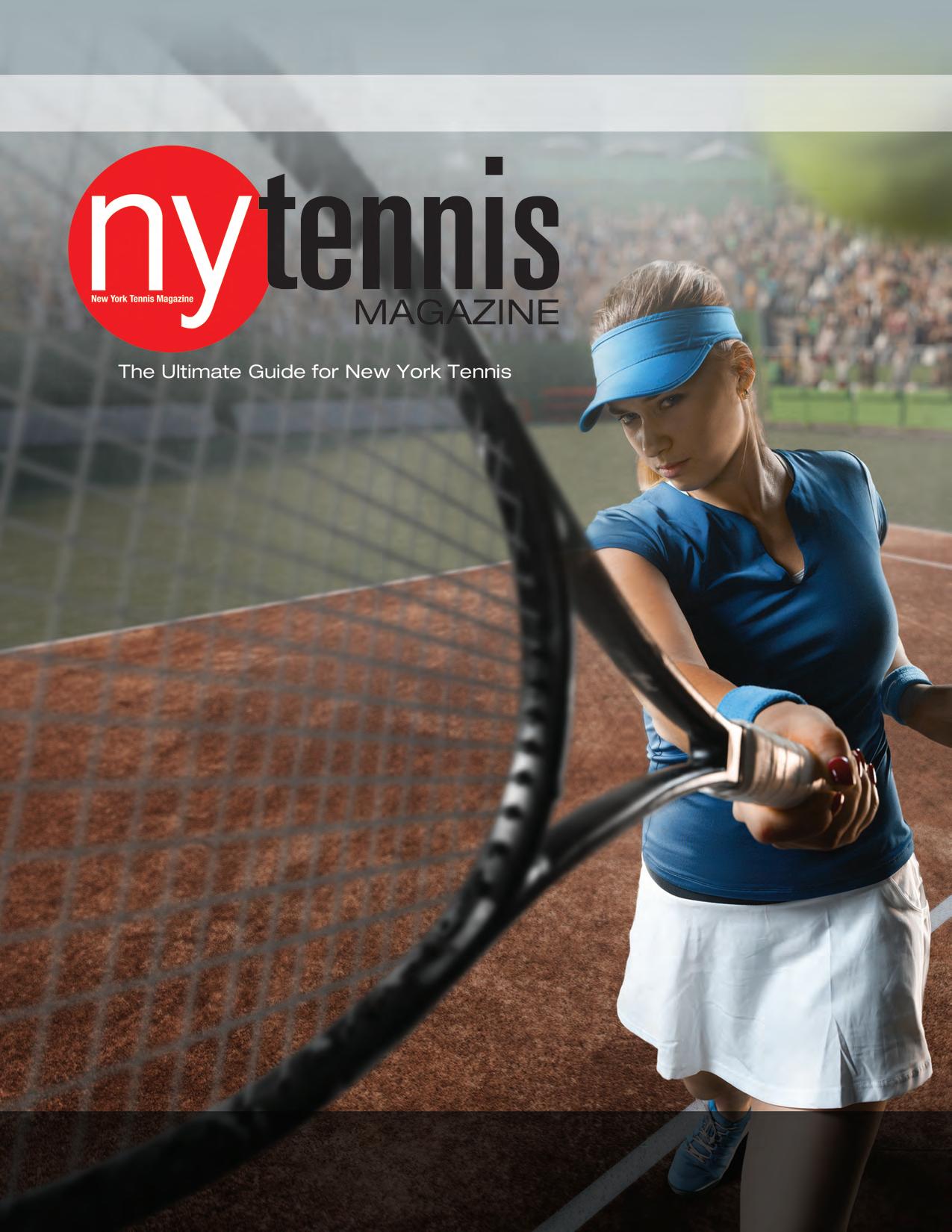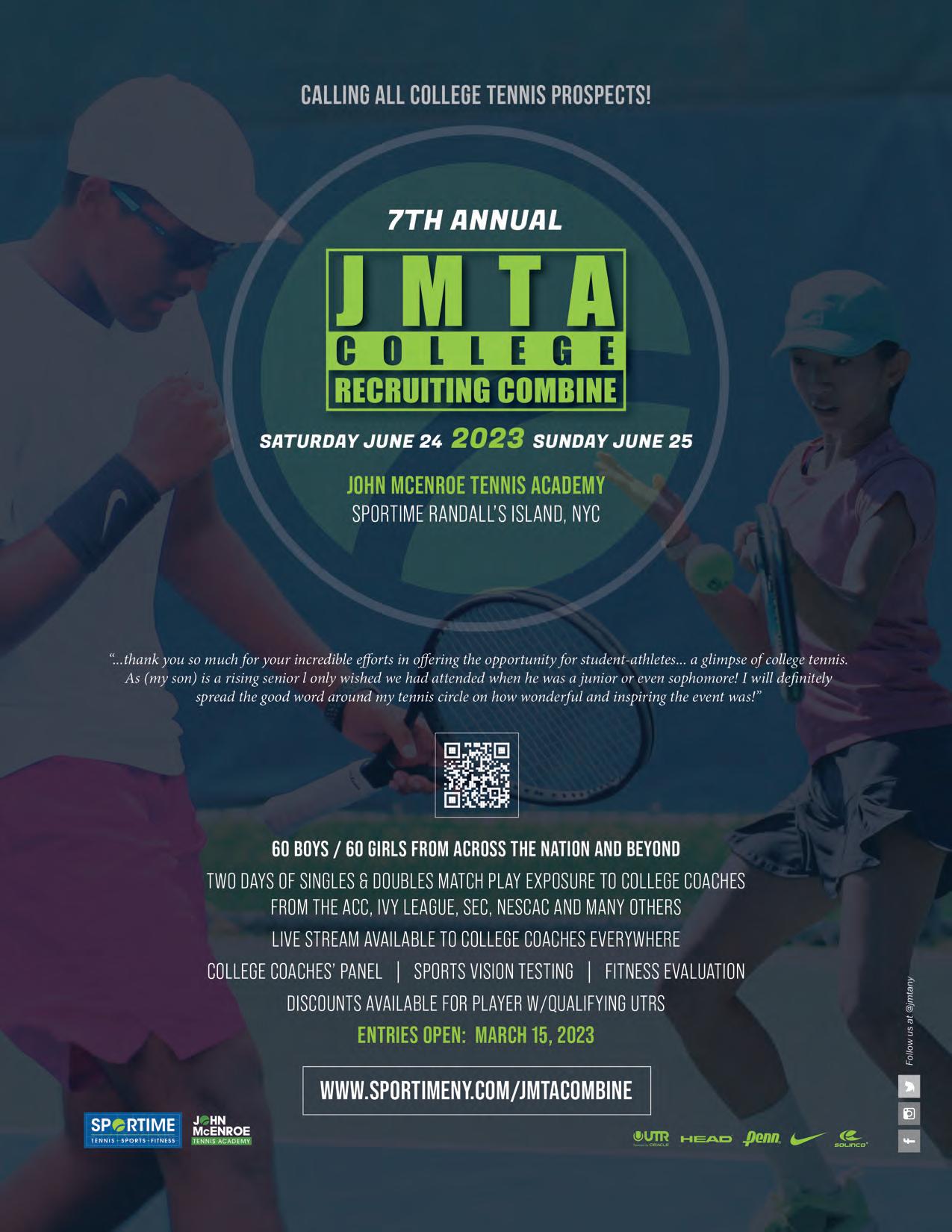






TheJohn McEnroe Tennis Academy (JMTA) held a special event to honor and recognize nine of the program’s top players, all of whom earned scholarships to play collegiate tennis starting this coming fall.
The players come from all parts of the greater metropolitan area, including Long Island, New York City and New Jersey, but all of them call JMTA home, and signed their official letters of intent to play college tennis at the 2023 JMTA College Signing Day:
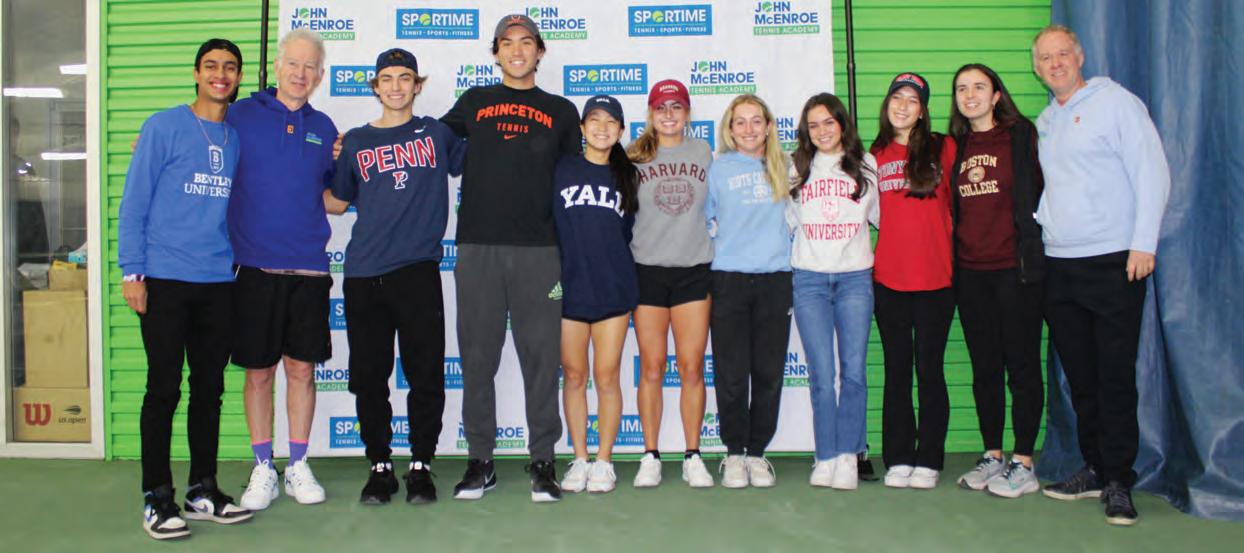
l Luka Butera, University of Pennsylvania
l Ansh Chadha, Bentley University
l Tola Glowacka, Boston College
l Erin Ha, Yale University
l Nicolette Loeffler, Fairfield University
l Dasha Perfiliev, Stony Brook University
l Thea Rabman, University of North Carolina
l Evan Wen, Princeton University
l Stephanie Yakoff, Harvard University
Held at Sportime Randall’s Island, the flagship home of the JMTA, players and their parents gathered as JMTA coaches spoke glowingly about these juniors. Speakers included John McEnroe, Patrick McEnroe, Lawrence Kleger, Brian Helm and Richard-John Mensing, who all talked about their positive experiences working with these players, as well as the excitement of the college tennis experience.
“I cannot express how proud I am of our student-athletes who signed their letters of intent! ,” said JMTA co-director Lawrence Kleger. “To see them from a young age develop their tennis skills and more importantly their life skills is incredibly gratifying.”
For the players themselves, signing their letters of intent and committing to a school where they will further their tennis and academic careers is a an important moment and the culmination of a lot of hard work.
“JMTA is such an amazing place that really treats their players and parents like family. They have helped me so
much on my tennis journey, helping me to round out my game and got me prepared for tournament play and beyond, including college life,” said Dasha Perfiliev, who will be playing for Stony Brook next season. “The ceremony was just one example of their consideration and pride they have in their players.”
Yakoff, who is headed to Harvard, added:
"I’ve only been with JMTA since September of 2021, but during this short time not only did they help me understand the process and all of the different components, but they also offered me great advice on how to approach everything. From the start, I felt that Patrick, John, Brian, Lawrence, Richard, and the rest of the crew had my best interests in mind and were genuinely invested in helping me reach my goals. The signing day ceremony was a momentous event for everyone involved, it signified sort of a new beginning, an occasion that welcomed the future and the potential that it holds."
1228 Wantagh Avenue, Suite 203 Wantagh, NY 11793-2202
Phone: (516) 409-4444 • Fax: (516) 409-4600
Web site: www.nytennismag.com
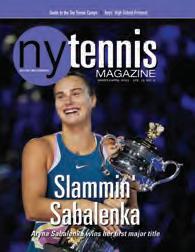
Staff
David Sickmen Publisher (516) 409-4444, ext. 309 david@usptennis.com
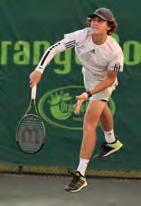
Brian Coleman Senior Editor (516) 409-4444, ext. 326 brianc@usptennis.com
Joey Arendt
Art Director
Marie Santora-Lent Advertising Coordinator (516) 409-4444, ext. 301 Marie@usptennis.com
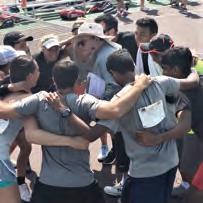
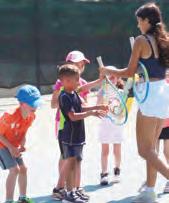
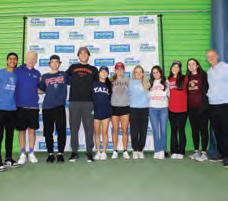
Emilie Katz
Assistant Marketing Coordinator
Dr. Tom Ferraro
Contributing Writer
Luke Jensen
Contributing Writer
Rob Polishook
Contributing Writer
Barbara Wyatt
Contributing Writer
Advertising
To receive any information regarding advertising rates, deadlines, and requirements, call (516) 409-4444 or e-mail info@usptennis.com.
Article Submissions/Press Releases
To submit any material, including articles and press releases, please call (516) 409-4444 or e-mail info@usptennis.com. The deadline for submissions is the first of the month preceding the target issue.
Subscriptions
To receive subscription information, contact (516) 409-4444 or e-mail info@usptennis.com or check out our Web site: www.nytennismag.com. Fax subscription changes to (516) 409-1600.
Statements of fact and opinion in New York Tennis Magazine are the responsibility of the authors alone and do not imply an opinion on the part of United Sports Publications Ltd. New York Tennis Magazine reserves the right to edit, reject and/or postpone the publication of any articles, information or data.
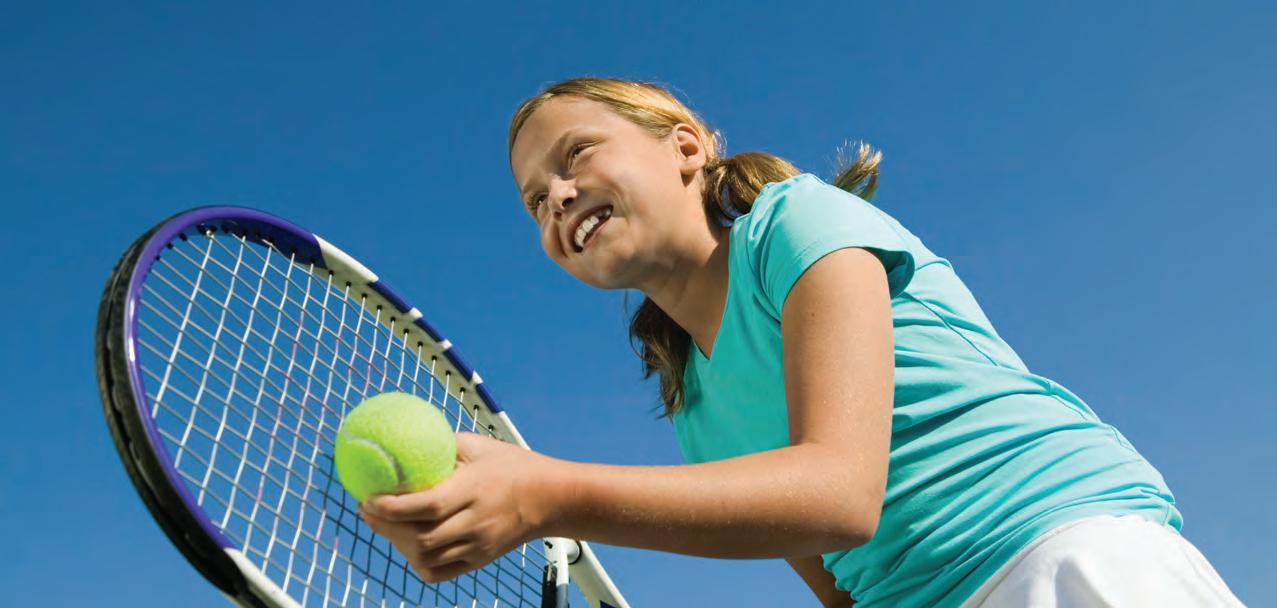
Growingup as a younger brother can bring out the ultimate competitiveness in anyone. And for Theo Murphy, looking up to his older brother, Nicholas, did just that.
Theo, who is two years younger, was eager to try and out duel his brother in whatever sporting event or competition they could find.
“It gave me something to chase and try to reach for. He was older than me, and bigger and better at sports at the time,” recalls Theo. “I always used to say to him, ‘Your two years older than me, wait until I’m your age. I’d beat you if we were the same age.’ I would try to put myself in his shoes, and I couldn’t wait to see where I would be when I was older. That always motivated me.”
That included tennis, and the more Theo watched Nicholas play, the more he wanted to play as well. To this day, he still looks up to his brother, and is a major reason why he began playing tennis in the first place.
He first began playing tennis when he was very young, playing in the camp at East Hampton Indoor Tennis on Long Island. He displayed a talent for the sport from a very early age so his parents decided to enroll him in lessons, and soon after that he was competing in tournaments.
As his talent grew, Murphy was playing at both East Hampton and the John McEnroe Tennis Academy at Sportime Randall’s Island, and would enter tryouts for the USTA Player Development Program at the USTA Billie Jean King National Tennis Center, a program which selected only a few players per age group.
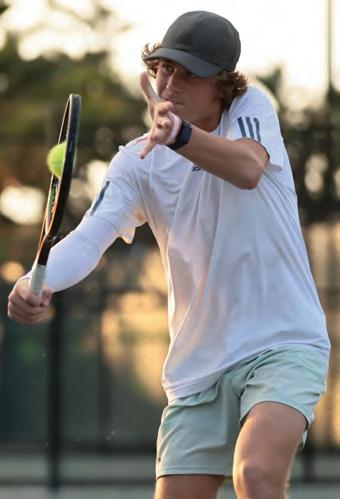
“I knew it was prestigious and hard to get into, but I wasn’t sure how well I would play so I just went into it trying to play my best,” said Murphy, the youngest player to be accepted into the program. “I was able to meet a few kids there who are still my friends today so it was a great experience. There were hundreds of the best kids from across the country, with some even coming from Europe, so ultimately being picked for it was a huge confidence boost for me. I think being in that group was a big reason why I had success early on in my junior tournaments, and I’m really thankful that I got to play at that level and compete with those players.”
But because of the COVID-19 pandemic, the program would be halted, and Murphy began training exclusively at JMTA. It was an important step for him as he got to compete against some of the program’s best players, regardless of age, something he was used to in competing against his older brother, and which would help him prepare for tournaments
where he was playing in an older group.
“When I first got to Randall’s Island, I came in as a younger kid but were competing against kids who were older,” said Murphy. “I think that playing up in age was a huge help for me, and being able to compete against players who hit heavier and play up in competition helped me develop my own power game and improve my game overall. When you get to the top of your age division, it’s a must to play up in the older divisions, so being able to do that in practice and in my training sessions really prepared me for the tournaments.”
The better he got, the more intensive his tournament and training became, which forced him and his family to decide what to do about his education. While the school he was attending had great academics, it did not provide the necessary flexibility that Murphy needed. There was one instance in
particular that made that abundantly clear.
“I was about 10-years-old and competing in a ‘Little Mo’ event, and my
partner and I were the top seed. The weather in Florida is unpredictable, and it ended up raining for a couple of days in a row,” he recalls. “We knew I had to be back in school and couldn’t spend any extra time in Florida, so I actually had to go to my partner and tell him the situation, and we had to pull out of the event.”
As Murphy visited many schools, one in particular stuck out. When his family toured Professional Children’s School, they knew it was the place to maximize Theo’s academics and tennis.
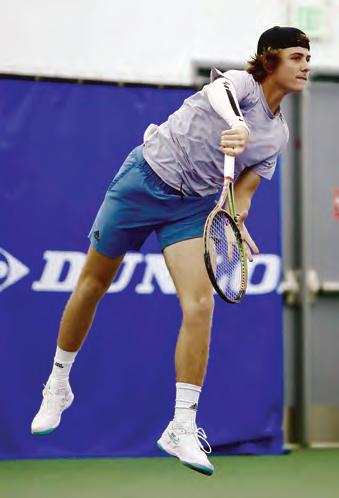
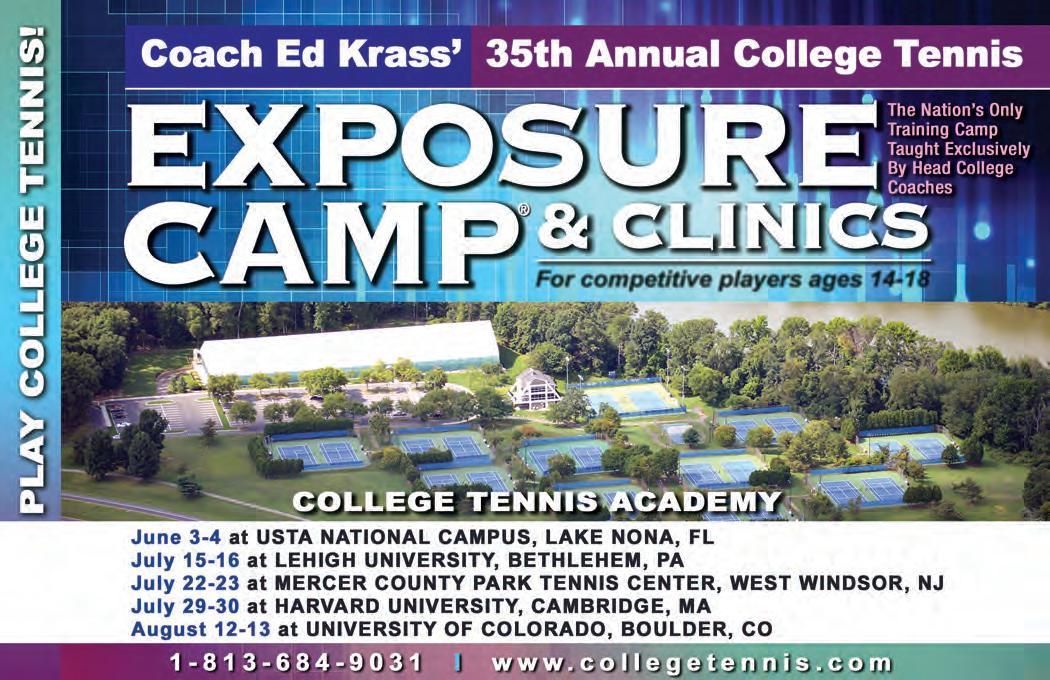
“Words can’t describe the flexibility I have now, and the change to Professional Children’s School has been amazing,” said Murphy. “When we first toured it, I was getting ready to enter seventh grade, I remember even in the first week I knew this was where I was going to be for high school. I went to them with my tennis
continued on page 6
continued from page 5
schedule and they instantly knew how they were going to work around it. They said we’ll put all of the classes in the morning so you are done at 12:30, and can be at practice by 1:00. It’s been like that for two years now and has been perfect for me.”
That flexibility has been integral in Murphy’s development over the last couple of years, and has allowed him to find the balance between academics and tennis, with neither one taking a backseat to the other. He is a dedicated student with academics as a priority, and PCS has only accelerated that.
“Being able to tell Professional Children’s School that I am going to be gone for a couple of weeks, they say it’s not a problem. They give me extensions on assignments, and do whatever is needed so I don’t have to stress about school while I’m away. It’s
helped my tennis tremendously.”
With that peace of mind, he continues to work hard in his training sessions to become the best player he can be.
“I’ve always played up in age so I’ve always tried to make my serve a big focus of my game. If you don’t have a strong serve, these older kids are going to attack it,” he explained. And ever since I was younger, I have tried to have the best footwork possible. I do a lot of fitness to help with my footwork and want to make sure I am in the best shape possible so I can be prepared for anything.”
Murphy is approaching the end of his sophomore year and is excited for what lies ahead in his future. While he would love to one day have a chance at a professional tennis career, his focus now is primarily on improving his tennis,
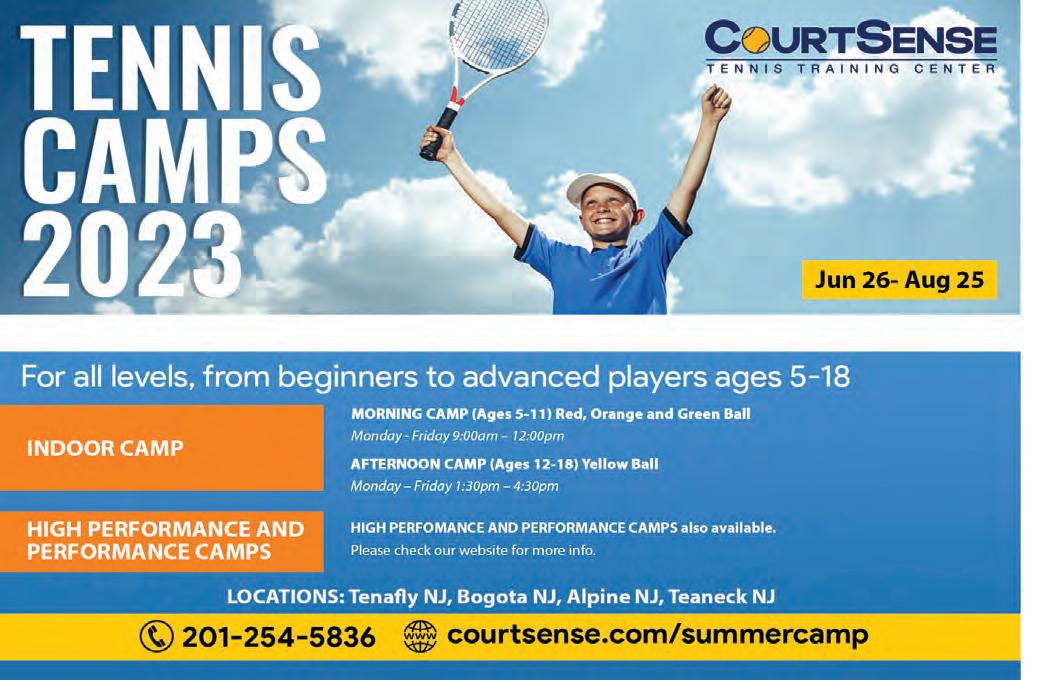
being a great student and using both of those to get a college education.
“I still look up to my brother and try to follow in his footsteps. He is a senior in high school now and a great student, so I want to become the best student I can be,” he said. “Every kid has the dream of becoming a professional tennis player, and that door is still open and something I strive for. But my main goals are to continue getting a great education and go on to play collegiate tennis.”
In the interim, Theo will continue to use his great education at Professional Children’s School and his top training at JMTA to become the best person he can be both on the court and in the classroom.
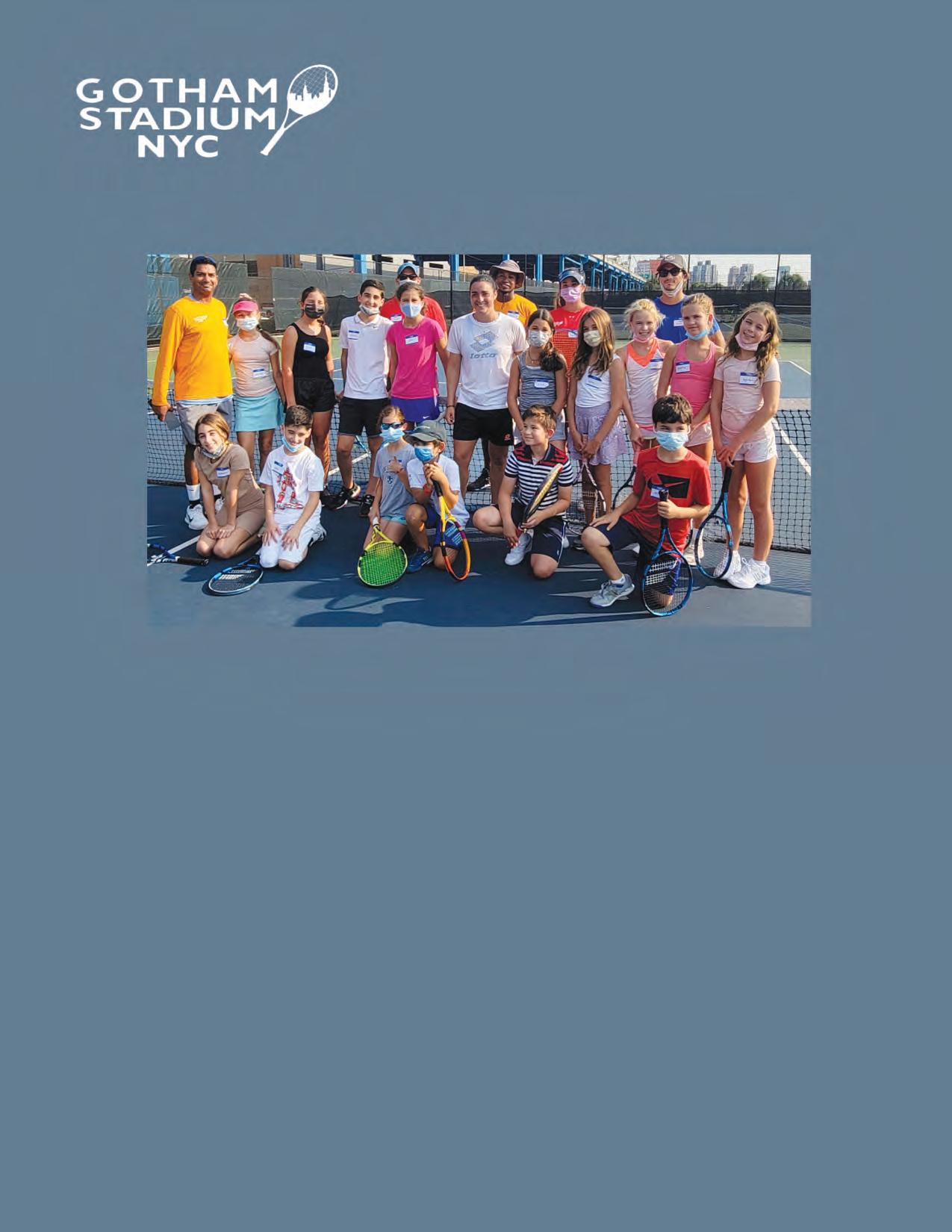
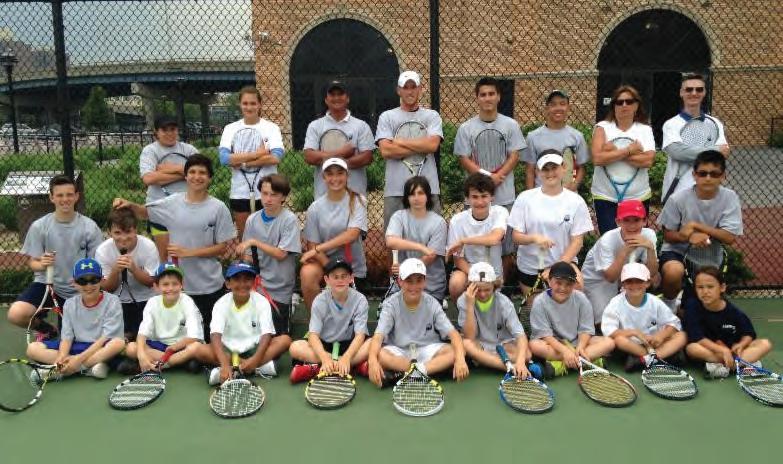
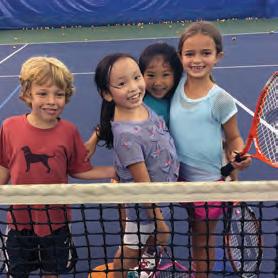
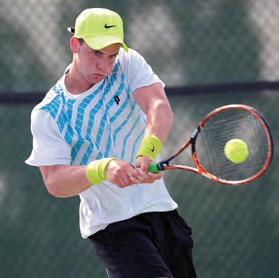
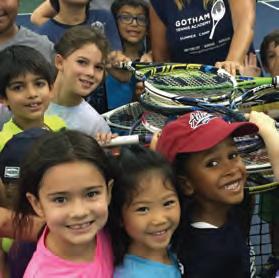
Inlate January, people from all across the Northeast came together at the Sheraton Hotel in Mahwah, New Jersey. The occasion was the annual USTA Eastern Tennis Conference, which brings together members of all the Regions that make up the Eastern Section for a weekend full of honoring those who made a positive impact on the sport of tennis in our community in 2022, while also looking ahead to another exciting year in 2023.
“What always makes the Eastern Tennis Conference so special for me is the opportunity for collaboration,” said USTA Eastern Executive Director Jenny Schnitzer. “Ultimately, we want to facilitate connections. It’s about providers or facility owners from opposite sides of the section running into each other in the hallway between sessions, catching up and sharing ideas. We want everybody who attends to learn from our incredible speakers, but it’s equally important to us that people come together and learn from each other, as well as hopefully commit to working with each other.”
And as Schnitzer says, it is precisely those connections and conversations that elevate the Section as a whole, and continue the successful trend of tennis growth that we have seen over the last several years.
“Those partnerships are ultimately
how we’re going to continue to grow our community, and also, I believe, why our area had the highest tennis participation rate in the country last year,” she said.
Throughout the weekend, the Conference featured an array of speakers, workshops and seminars on a variety of topics, ranging from teaching methods, business advice, coach engagement, bringing tennis to those with special needs, how to create a tennis community, and so much more.
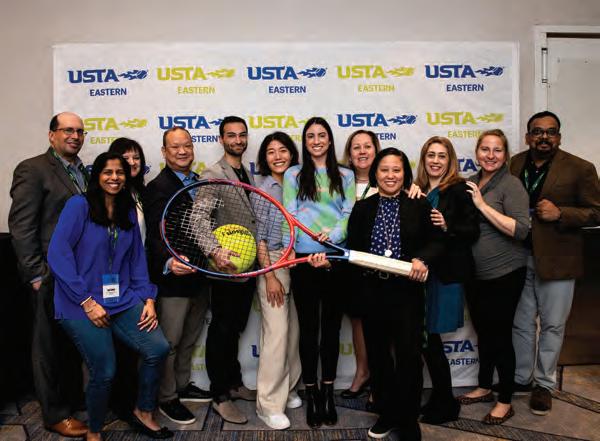
A highlight of the weekend was the discussion with former Eastern standouts who went on to have professional tennis careers, featuring Kristie Ahn, Christina McHale and Noah Rubin. The trio discussed their experiences growing up and developing in the Section, how it helped them prepare for careers on the pro tour, and looking ahead to the next chapters in their respective lives.
An intriguing workshop was given by Centercourt Tennis Academy’s CEO Conrad Singh. His academy has produced a number of junior champions on the international stage in recent years, including multiple junior Wimbledon champions.
“As a global coach educator having presented in countless coaches conferences over the years, the Eastern Tennis Conference is a special one. It is home,” said Singh. “We love
to discuss and share what we do at Centercourt and to be part of the community to create a unified strong culture in the East is key. Collaboration, building together and helping one another as Academies and Programs will ensure that we continue to produce incredible results as a region. Many participants approached me postpresentation to discuss the importance of the topic I shared.”
And for Singh, an important component of this year’s conference was being able to have it in-person rather than virtually. That face-to-face interaction is invaluable, and those connections formed go a lot further because of it.
“Being able to mingle and discuss topics, and to know people and gain these experiences together is a very different situation than attending a conference virtually,” Singh added. “I was able to place names to faces, and meet many terrific coaches and discuss real ideas that are present on the court and that we deal with everyday in the tennis world. By staying close to each other, and making the most of each opportunity that comes our way, we strengthen the foundations of tennis here in the east.”
The Conference was capped off by the Awards Dinner, where the Section was able to honor and recognize the best of the best in 2022.
“Tennis is undeniably having a
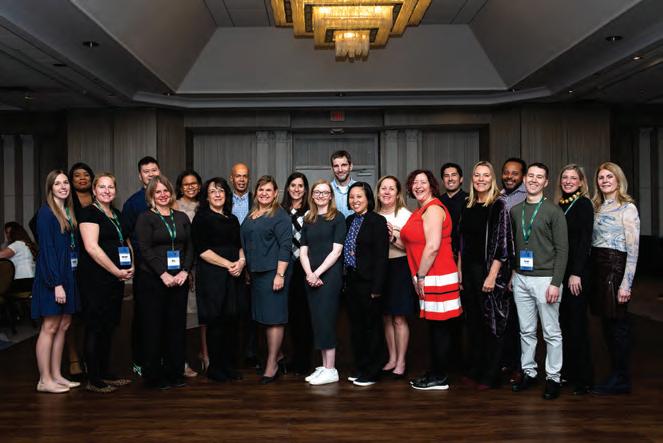
moment right now, and we just learned that participation in the sport grew again in 2022, and that 5.9 million more people have picked up a racquet since 2020,” Schnitzer added. “That’s really a testament to all the hard work of the individuals who attend our conference. They’re on the
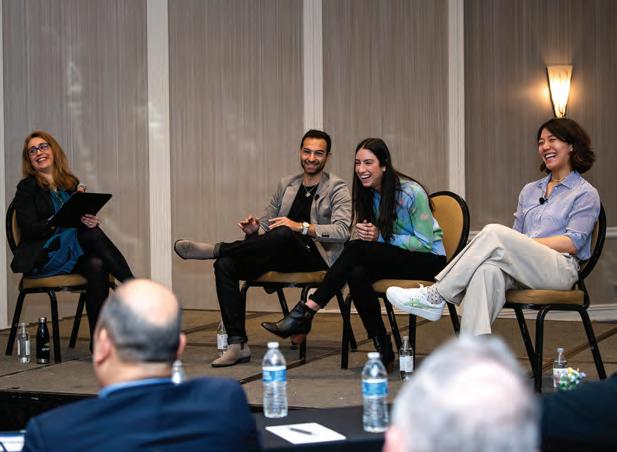
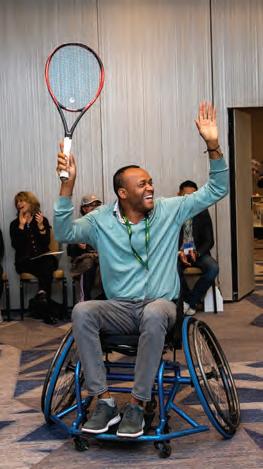
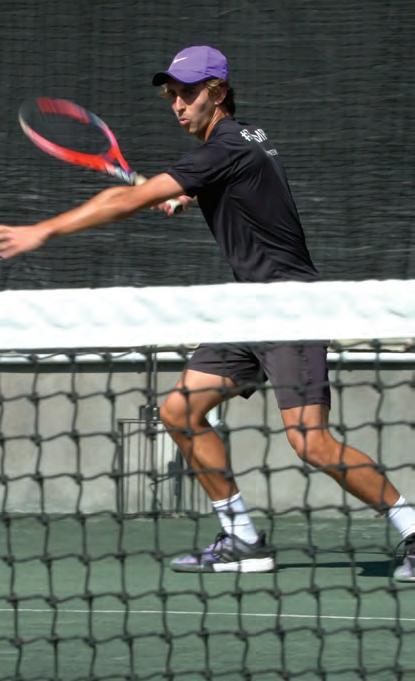
ground every day, creating play opportunities and making the game more accessible for all who wish to participate. With our annual event, we really wanted to acknowledge and celebrate their efforts over the last few years. But we also know that we have to keep building on that success, and See
so we developed a schedule that we hoped would empower our guests to hit the ground running in 2023. We know that together over the next 12 months, we can reach even more people, and that is ultimately the message we wanted to impart over the course of weekend.”
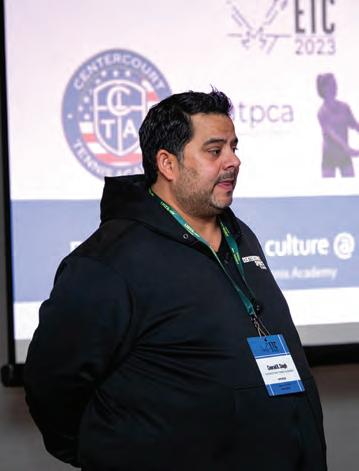
Asshe stood at the baseline inside Rod Laver Arena, one point away from winning the first major title of her career, Aryna Sabalenka had to dig deep. She had the match, the championship, resting on her serve, and for one of the best power players in the women’s game, that should have made her confident.
But she double-faulted, and then mishit back-to-back forehands to let three different match points slip away. It all could have fallen apart there, especially for someone like Sabalenka who had struggled so mightily with her serve in the past. However, this version of Sabalenka was different, and refused to let a fourth match point go by the wayside.
When Elena Rybakina’s forehand sailed long and past the baseline, Sabalenka’s dream was realized. She had completed her 4-6, 6-3, 6-4 victory and was now the Australian Open champion.
“The last game, yeah, of course, I was a little bit nervous,” Sabalenka admitted afterwards in her post-match interview. “I kept telling myself, ‘Nobody tells you that it’s going to be easy.’ You just have to work for it, work for it, ‘til the last point. I’m super happy that I was able to handle all those emotions and win this one.”
Then during her speech, she acknowledged the work her team had done to help her get to this point.
“We’ve been through a lot of, I would say, down times last year,” she said. “We worked so hard and you guys deserve this trophy. It’s more about you than it is about me.”
Sabalenka has been a mainstay inside the Top 10 and reached three different major semifinals before this year’s Australian Open. But last year, she seemingly developed a case of the yips. She couldn’t serve, and ended up leading the entire tour in double-faults in 2022, finishing with 389 double-faults on the year, nearly 100 more than the person who finished with the second most.
She is very open about the frustration she felt during those times and how becoming vulnerable and admitting she needed help in order to fix it led to this turnaround.
“I was, in that moment, open for whatever,” she said. “I was just like, ‘Please, someone help me to fix this f*****g serve.
At first, she thought it was simply a mental block preventing her from maximizing her
continued on page 12

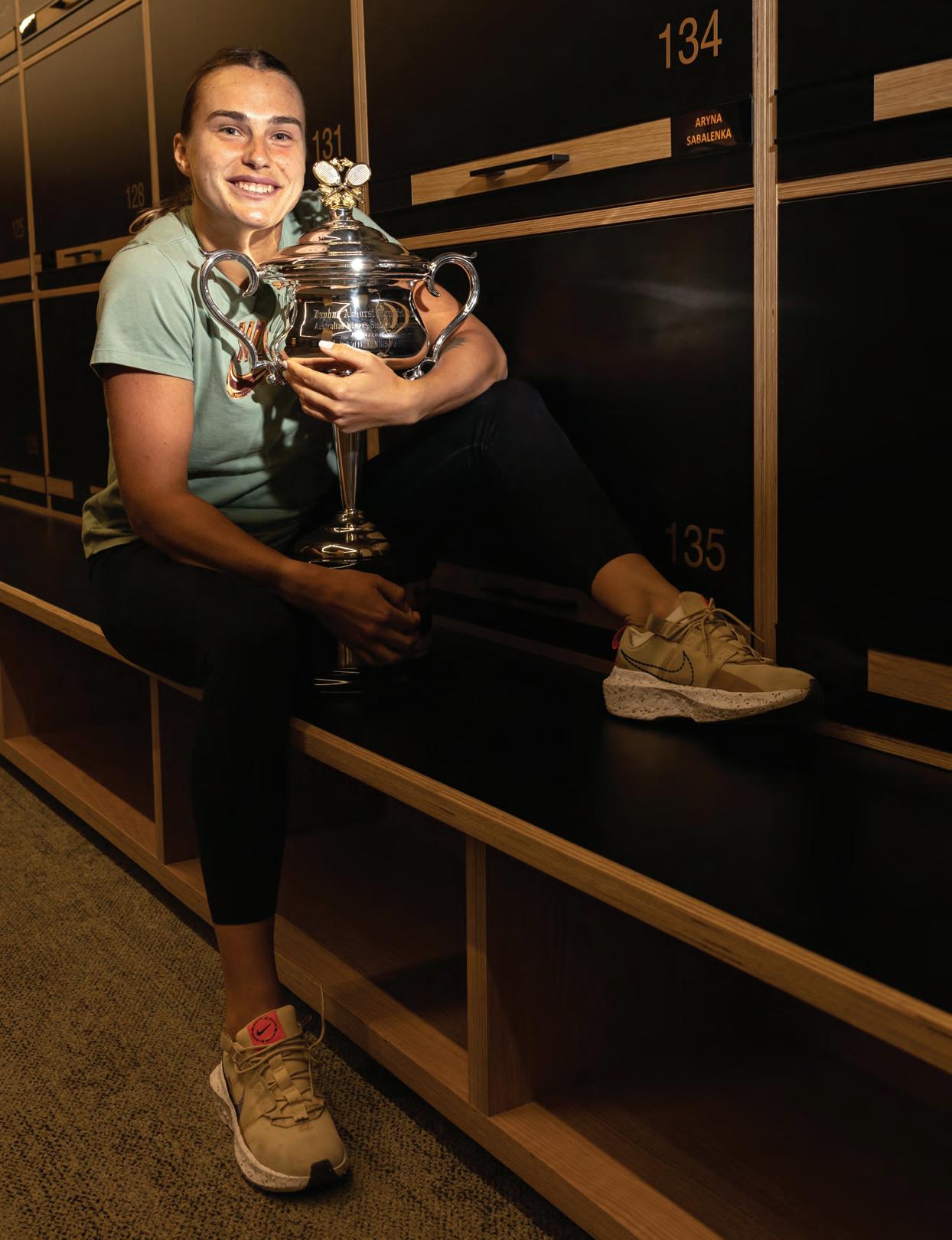 Photo credit: Fiona Hamilton/Tennis Australia
Photo credit: Fiona Hamilton/Tennis Australia
serve. But after consulting with a biomechanics specialist, they worked on fixing it.
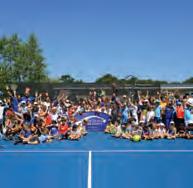
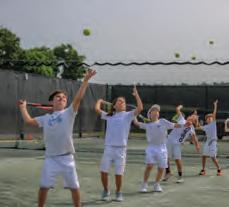
“Before, I wouldn’t really be open for that. I would be like, ‘You know what, my serve is fine. I don’t want to change anything.’ But actually, even when my serve was working, it wasn’t really right,” she said. “We watched a lot of videos. He was just showing what’s not really right about my serve, [why] there’s no way I can put it in. Just a lot of videos, a lot of talking, a lot of trying things. I’ve done a lot. I worked so hard. Even when my serve was, how did you say, ‘disaster’? I worked a lot on my serve. I kept trying, kept believing, kept changing.”
All of that work and all of that change came through on the court during her two-weeks in Australia. In her seven-match run, she committed a total of 29 double-faults. Last year, when she was defeated in the fourthround, she committed 56 double-faults. That contrast is a major reason for her success, and was evident on the court, as even her opponent Rybakina admitted:
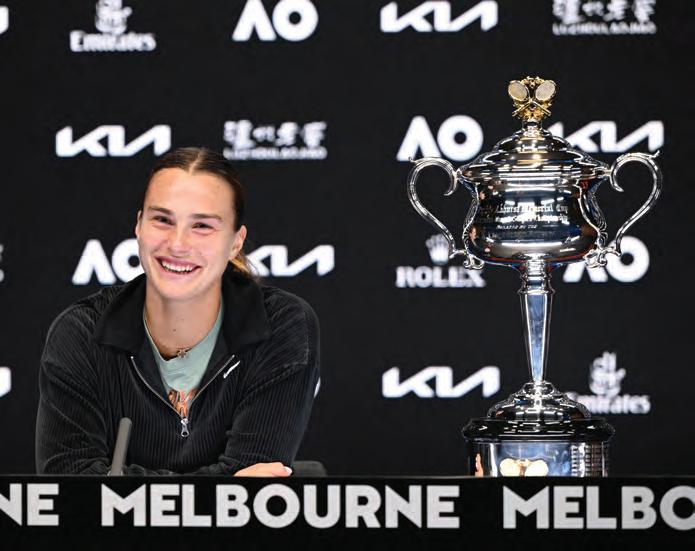
“For sure she served really well today, no matter the double-faults. [She had a] few second serves she hit
probably as a first serve,” said Rybakina. “It’s not easy mentally. She didn’t have a great serve last year, but now she was super strong and she served well. For sure I respect that. I know how much work it takes. I would say that not any girls can put me really under the pressure. Against her, it’s not easy because she has a great serve, and
she plays really aggressive.”
Playing fast and loose was an important strategy for Sabalenka as evidenced by Rybakina discussing how she hit some of her second serves as if they were first serves. The Sabalenka of 2022 probably would not have had the confidence to do that, but with the confidence in her serve and power game back, she let it fly.
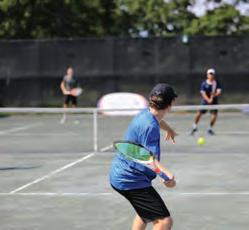
And as she says, she made sure to learn from those tough times last year, and use them to improve. Now, she is a Grand Slam champion.
“I really feel right now that I really needed those tough losses to kind of understand myself a little better. It was like a preparation for me,” she said. “I actually feel happy that I lost those matches, so right now I can be a different player and just a different Aryna, you know? I started to respect myself more. I started to understand that I’m here because I work so hard and I’m a good player. Just having this understanding that I’m a good player, and that I can handle a lot of emotions and a lot of things on court. Every time I had a tough moment on court, I was just reminding myself that
I’m good enough to handle everything.”
The task now for Sabalenka is to build off of this success. She has her sights set on the World No.1 ranking, and although she still trails Iga Swiatek for that position, Sabalenka is hungry for more as she moves forward in 2023 and beyond.
Sabalenka now has the proverbial monkey off of her back, and is in possession of a major title. The question now is if she can repeat this success, and she is confident she can.
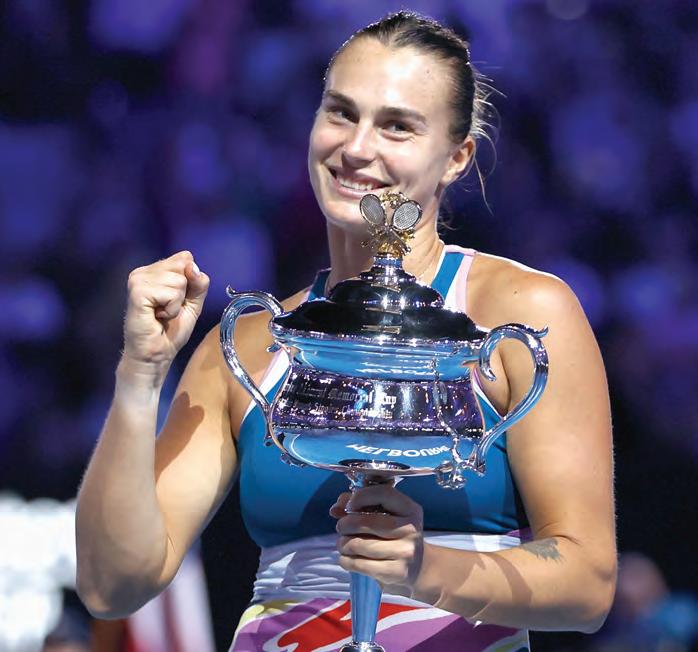
“I couldn’t believe it in the beginning. Then the next week I was like, ‘Oh my God. I did it. Yes, it happened,’” she told reporters as she prepared for the Dubai Duty Free Championships. “It’s so amazing. Now I have even more motivation to work hard just to feel it again. I still have to work hard. I still have to prove every time on the court that I’m in the right place.”
Brian Coleman is the Senior Editor for New York Tennis Magazine. He may be reached at brianc@usptennis.com
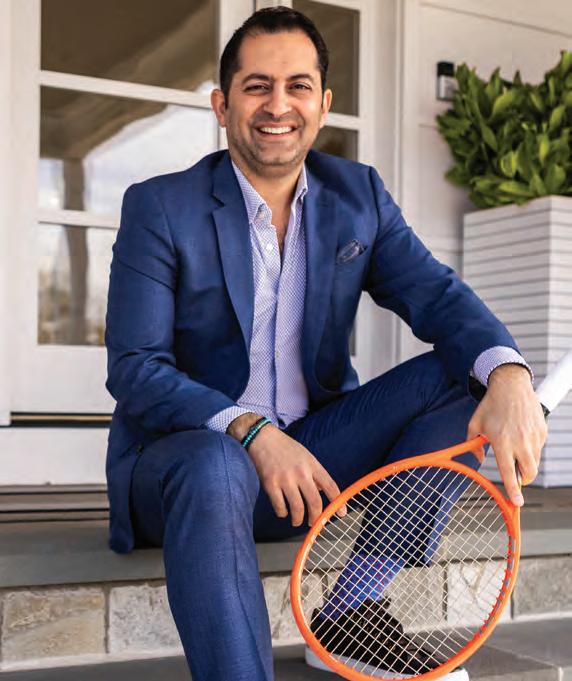
Aswe move closer to the end of winter with spring on the horizon, we approach a new season of boys’ high school tennis in New York City.
A year ago, the Hunter Hawks won the program’s first-ever NYC PSAL “A” Division title with a thrilling defeat against Bronx Science, and will aim to make it back there again this season. In the “B” division, Frederick Douglass went undefeated on the season en route to claiming the city championship.
Now as we look ahead to the 2023 season, which gets underway on March 27 in New York City, New York Tennis Magazine examines some of the players and teams to watch for this upcoming spring.
*All names, dates and locations are subject to change. Be sure to check LITennisMag.com for the most up to date information on all things high school tennis.
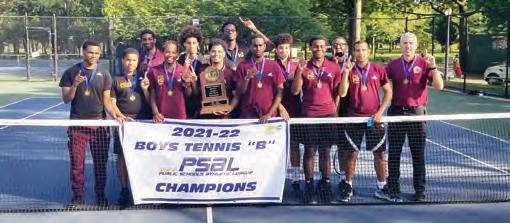
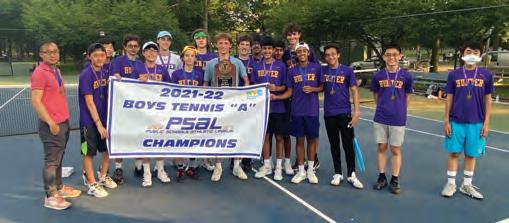

Hunter
As mentioned in the beginning, Hunter captured the first city title in program history last year, and will now have a target on its back this season. That Hunter team was extremely young and thus will have both a talented and experienced roster as it aims to defend its title. Leading the way will be junior Kyler Swiatocha, who competed in the first singles position a year ago. Bolstering the lineup is sophomore Neel Mathur and junior Nikita Staniloae at second and third singles, respectively. While it will be without graduating senior David Pomerantz from the doubles tandems, Rahul Vasudez, Weston White and Jeffrey Tsai will all return to give Hunter a well-balanced starting lineup.
Beacon
Last season was not the typical dominant one that we have become used to seeing from Beacon, but that is more of a case of the Blue Demons being victims of their own expectations and standards. Beacon still reached the NYC quarterfinals, but hopes to do better than that this spring with a top-end starting lineup. Erik Johansson will look to have a big senior season in the top singles spot and will anchor a
lineup that also consists of junior Arjun Agostinho and sophomore Anthony Abbott, as well as the first doubles tandem of Jordan Klein & Sandro Buskhrikidze. The Blue Demons should once again be a threat deep into the “A” division playoffs.
Bronx Science
Despite the loss of its second singles player Ryan Friedman to graduation, the Wolverines of Bronx Science are prepared to make yet another deep run in the playoffs. A runner-up a season ago, Bronx Science will be led by senior Fredrik Lundquist who assumes the first singles position once again this year. Junior Colin Hui, who played third singles a year ago, will likely move into the second singles position this season. Hui was among the wins leaders in all of New York City at third singles in 2022, and will look to continue that success as he moves up the lineup. Bronx Science returns all four doubles starters, Sebastian Rosero Mayer & Kenya Takaku at first doubles, and Sungjin Yun & Jeffrey Yang, to create an experienced team ready to return to the city championship.
Frederick Douglass
Frederick Douglass did not drop a match at all last season, and enters 2023 eager to repeat that success this coming spring. Frederick Douglass has now moved into the “A” division this season and will be competing against tougher competition, but with its talented core returning, the Lions are prepared to show they belong. Senior Shawn Mitchell Yon, who captured the singles title at the PSAL Individual Championships last year, will anchor a lineup that will feature junior Jeremy Victoria, and sophomore Joshua Bey. It will be tough to make up for the loss of senior Derwin Guzman who provided invaluable leadership to the team, but Frederick Douglass’ depth including Kamren Harden, Alejandro Inoa and Altenor Molien will look to pick up that mantle.
Stuyvesant
Stuyvesant surprised some people last season when it powered its way

to the semifinals as the tournament’s fifth-seed, and the Hitmen will be seeking to back up that success in 2023. As a freshman, Stanley Yoo led the way playing at first singles, winning all of his matches in the playoffs and is out to continue that success in his sophomore campaign.
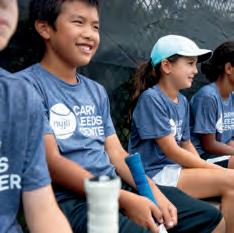
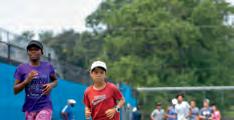
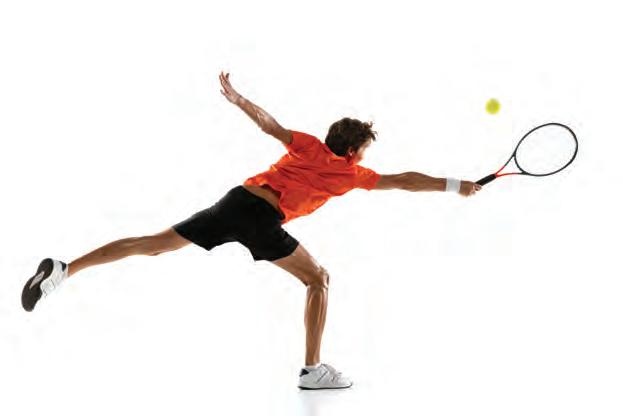
Prescott Jain and James Xu, a junior and sophomore, respectively, round out the singles lineup as Stuyvesant, despite its youth, brings talent and experience into its season this spring.

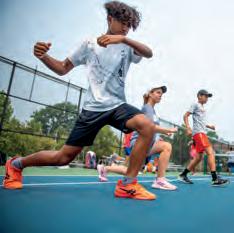
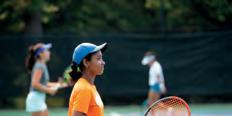
The Seagulls have been the dominant team on Staten Island over the last several years, and posted an undefeated regular season last year. Staten Island Tech would fall in the quarterfinals of the city playoffs but hope to go beyond that this spring. Leading the way will be sophomore Jeffrey Safir who played first singles a year ago, and will be backed up by two seniors in the singles lineup: Derrick Chen at second
singles and Isaac Muravchik at third singles. Only one person from the 2022 starting lineup will not return this season, William Olsen, with Jesse Kipnis, Michael Olsen and Justin Tsemekhin returning to help Staten Island Tech continue their success.
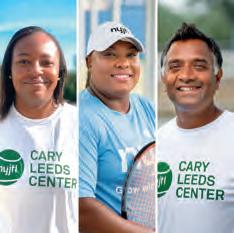
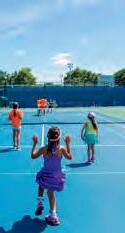
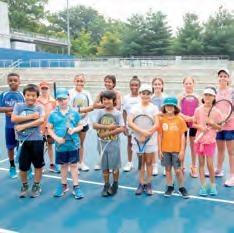

(in addition to players listed with their teams)

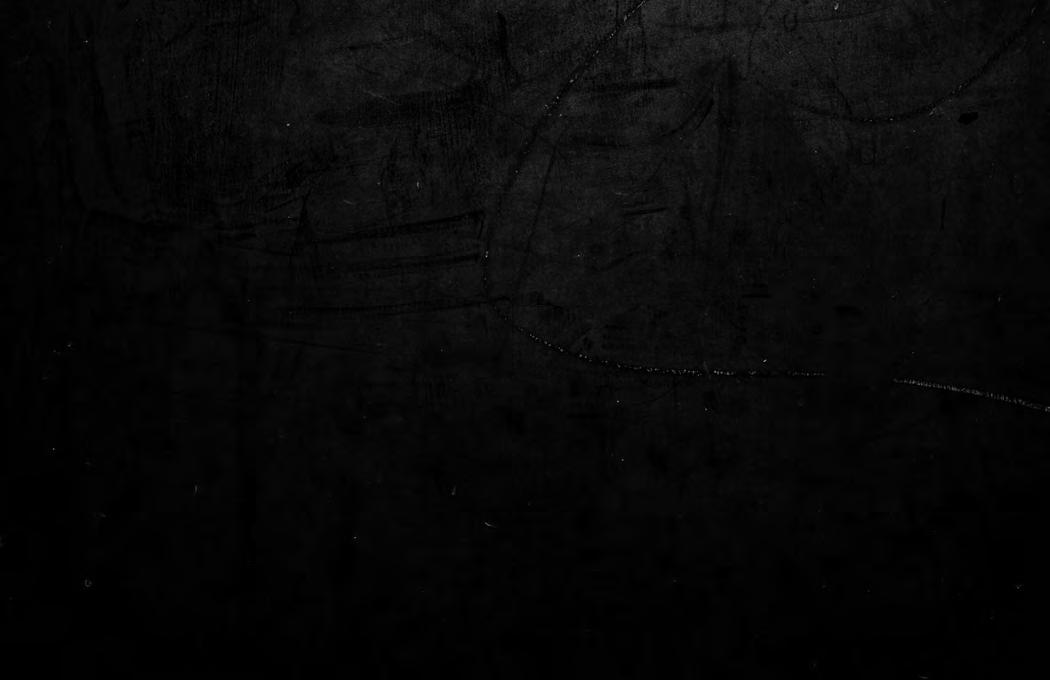

l Nathan Barash, Petrides
l Justin Chong, Townsend Harris
l A.J. Esperanza, Lincoln
l Dennis Krupnik, Midwood
l Richard Lee, Bard
l Kaan MacDonald, Eleanor Roosevelt
l Adam Shtaynberg, New Dorp
l Nicholas Vasilescu, Brooklyn Tech
Tennisis such a globalized sport which means many things for a growing tennis player. It might mean traveling away from home at a young age, living abroad or meeting new people weekly at tournaments, and therefore the most essential skill is that of being able to adjust constantly.
Learning to accept being uncomfortable both on and off the court is key and this is often the challenge for most players. Whether it’s feeling homesick, learning a new language, dealing with new courts, eating different food or simply being immersed in a completely different culture players need to be ready for the unexpected.
In America, it is the dream for most juniors to play for a college team. Being part of a team will take a
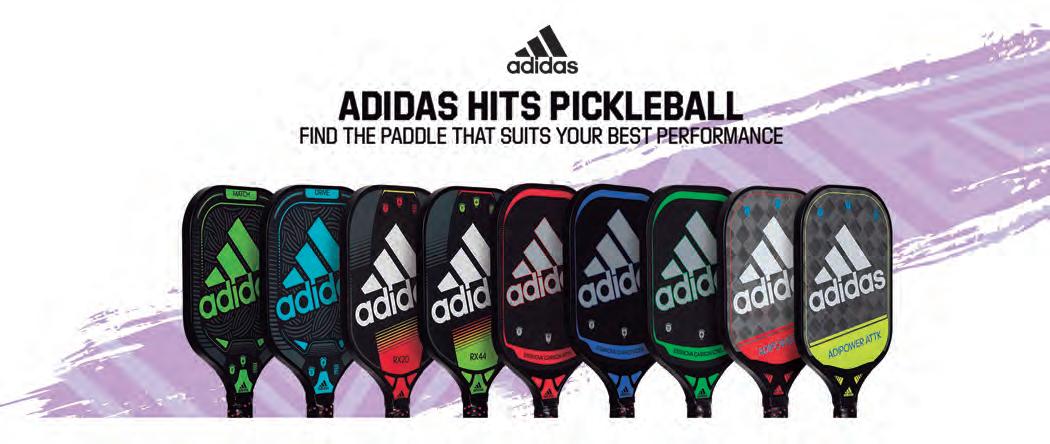
considerable amount of skill as you adapt to that new environment and it’s important to maintain one’s composure when things become difficult. This can be having issues with a teammate or a coach, or other personal difficulties off the court, these are things that they may experience as a part of the entire process and need to be planned for. Because of this, finding a Holistic Balance is key, and the way to achieve this can vary. Players are facing not only the thrill of competing and winning, but they will inevitably also experience losing and multiple disappointments on a regular basis.
Let’s also remember that teenagers are growing and developing their own individual personalities and are under enormous pressure to perform daily. With ever-changing
environments when traveling for tournaments or while training in different locations and almost living out of a suitcase players need to maintain a healthy balance. This is where the role of a Recreational Therapist comes in handy for the team, and helps ensure players are able to decompress through many very useful measures such as:
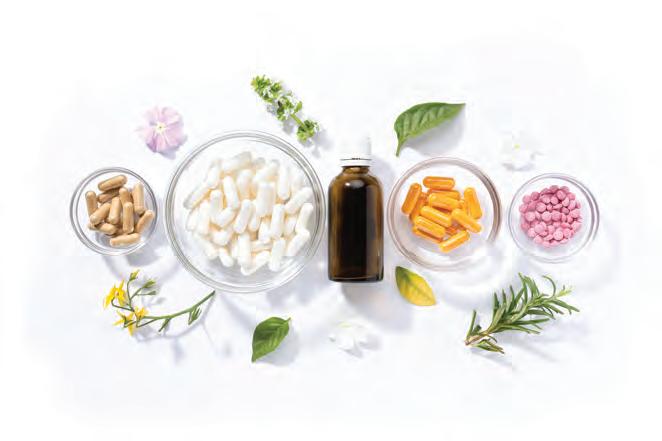
l Social Outlets with friends away from the team and coach
l Other interests such as sports, gym, stretching, massage, etc.
l Meeting with mentors and having the chance to discuss their lives without judgment
l Planning sightseeing trips and visits to iconic places
l Scheduled attendance to shows, concerts or plays.

Being a teenager is already a challenge in itself and adding to the complexity of achieving sports goals, academic goals, social goals and personal growth could certainly make teenagers feel overwhelmed. It is important that players and coaches seek out the use of therapists and assistants as well as a calendar of events aside from tennis to help players maintain balance.


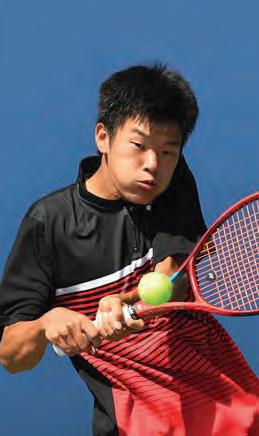
Normally, teenagers staying at home would get close guidance from their family but in the case of traveling tennis players, this can be entirely different. Players need time to process major events such as big wins or losses and often this is something that goes missing because of schedules that are fast and furious.
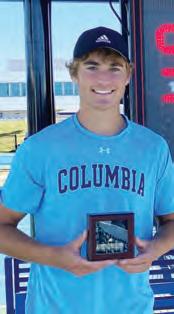
As a professional Recreational Therapist, I have witnessed these ups and downs from countless players from all over the world over many years. Assessing their emotional needs helps them feel comforted and


a bit more connected, hence its important to make time for this and to create the safe space athletes need to discuss important topics.
Although their backgrounds, traditions and languages are very different, and even though the love for the game is the common denominator, it is of great importance when the recreational therapist makes sure to work every single day on building the team spirit and the feeling of belonging among players.
It is of great importance to organize activities off the court for these players on a regular basis, since it is a healthy way to keep a balance between life on courts and



outside of them. Leaving technology aside to favor the interaction among them is key to achieving this, and learning to speak, discuss important topics and to be present and connected to self-wellness is essential.
At Centercourt, our philosophy of ‘Teach what is Essential, Encourage what is natural and allow for each individual” applies to all areas of development both on and off the court. As parents and coaches we all need to understand that building an athlete from inside to out is critical and that all young athletes need to maintain balance on and off the arena as a priority.

Adela Carvajal Chavez is currently the recreational therapist for Centercourt Tennis Academy. She has previously worked in the same field in Tennis
and schools in China, Mexico City and Puebla. She enjoys having a meaningful task that allows her to support young athletes reach their lifetime goals and dreams. She may be reached at adela@centercorutclub.com.

TheMetro Corporate Tennis League presented by Advantage Tennis Clubs is an initiative of the Metrotennis Community Tennis Association (MCTA).
The league is currently in the midst of its Winter 2023 season, with teams deep into regular season action with the playoffs and end-of-season finals and party on the

Advanced Bloomberg
NYJTL/Cary Leeds
Credit Agricole
Proskauer Rose
Advanced Intermediate Bank of America
ING
Latham & Watkins
Neuberger Berman
Natixis
Bloomberg Gibson
horizon. The season began in early February and will run through April, with the finals set for Tuesday, April 18. Below are the current standings for the Winter 2023 season. Be sure to read the May/June 2023 edition of New York Tennis Magazine for a full recap of this season and the finals.
Intermediate Division 1
PwC
Bloomberg (M)
Bloomberg (C)
D.E. Shaw & Co.
Intermediate Division 2 Paul Weiss Team Elliot
Bloomberg Turner
Intermediate Division 3
Sullivan & Cromwell
Fried Frank
Latham & Watkins
Bloomberg
Intermediate Division 4
HSBC PwC
Proskauer Rose
Corcoran
For more information regarding the Corporate League,including its new Hi-Five leagues, please visit www.metrotennis.com under tab labeled, “corporate” or e-mail Luis@metrotennis.com.
At Gotham Tennis Academy, we're passionate about teaching tennis. From beginners to rising stars, Gotham's PTR certified pros are experienced in teaching the fundamentals while stressing sportsmanship, hard work, and fun. With our prime location at Stadium Tennis Center - NYC's newest and largest indoor/outdoor tennis center, we're only a short trip away from you. It's more convenient than ever to get your kids into the game.
To enroll now and learn more, please visit www.stadiumtennisnyc.com or call 718-665-4684
www.stadiumtennisnyc.com
Gotham Tennis Academy is a leading operator of innovative tennis programs in NYC and Montauk in the Hamptons.
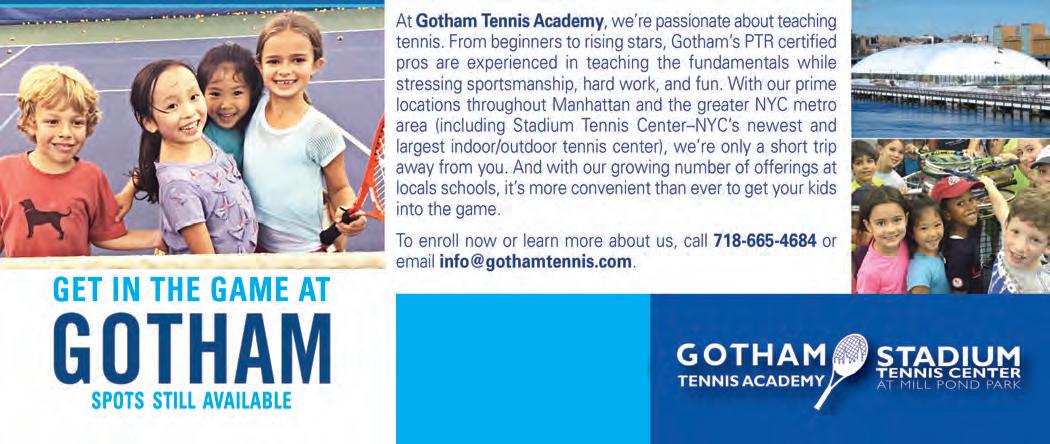
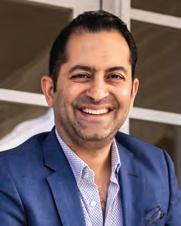
LongIsland native Parsa Samii was a top junior tennis player who went on to have a successful collegiate playing career before becoming a high-performance tennis coach here on Long Island. Now, Samii is one of the area’s most respected real estate agents, and is using a lot of what he learned as a high-level tennis player and coach to find success in the real estate industry.
Long Island Tennis Magazine spoke with Samii about his time in tennis and how he has used his experiences in his current profession.
How long were you in the tennis industry?
I always consider this as an interesting question. I started playing tennis at 13, and from the moment I picked up a racquet, it was love at first sight. From playing college tennis, to dabbling at the professional level, and then coaching players at the highest levels in the junior and pro game, it’s safe to say I have been in the tennis community for over 30 years.
What led you to pivot out of tennis and move into the real estate world?
I’ve always approached coaching with a high level of intensity, and I taught every lesson as if it was the finals of a tournament. As a coach, you truly are only as good as your last hour. When I began to have to alter my coaching style in order to stay healthy, it sort of took the passion away, and became more of a “job”. When that threshold was crossed, I felt like I was working to make money, it just didn’t have the same feel or excitement that I had always associated with tennis.
What are some of the similarities you found between coaching tennis and what you do now as a real estate broker?
I find that the similarities are incredible. First, the emotional and mental swings of a successful real estate transaction are so similar to the pillars of strength and belief you need to have as a coach and player. My unwavering, stoic, intense attitude in real estate is the same as a coach. If there is a will to get to the finish line, then there is always a path to that goal and we will succeed no matter the challenges that we may face. Second, I would say is relationships. You have to understand people, their needs and wants, strengths and weaknesses and tailor your advice to help them understand what they need to be doing in order to achieve success. On the tennis court I call this your “steps to success.” Lastly, being in a commission-based business you are compensated when you’ve completed a
transaction, very similar to teaching a lesson and being paid at the end of it. I can go on about this but I feel these are the three biggest ones.
How has what you have learned through tennis helped you succeed in the business world?
Tennis gave me the platform to understand so much about myself and how I approach various problems that inevitably arise. You must adjust quickly, you must maintain a true sense of self, and you must ensure that your adjustments fall within the confines of your capabilities. Tennis forces you to think strategically through different challenges. And while experience helps, it’s the problemsolving skills learned on a tennis court that have given me the confidence to always find a way. That idea of perseverance directly translates to business when different variables arise. Having that knowledge and confidence provides immense power and self-assurance in the business world. Nothing comes for free, and you have to work for what you want. I find that tennis and business both follow that principal.
What do you recommend to people who have been tennis players/coaches, but are struggling to find their way in the business world?
I actually get a lot of calls from former players and coaches who want to learn my formula for success and how I navigated through my professional transition. My response is always the same: you need to do everything in your power to be an expert in your field. No one should know your product better than you. I enjoy helping players, coaches, business people and clients find their way. I truly believe that everyone has an extraordinary gift inside them and I love to help people identify what that is.
How often do you still play tennis, and how are you balancing your life between tennis, your job and family?
The ebbs and flow of real estate are extreme. When it’s busy, it’s very, very busy. But when it’s slow, it can be a time to take a break, hit some balls and plan for the business year to come. My time on the court, as a player, varies but I probably average once a month and I still coach a few hours a week. Family wise, this unique flexible career allows me to be home for dinner almost every night but I’m working every weekend for more than half the year. It’s always a challenge to balance everything, but I do my best. Every person and their career present its own challenges, and finding balance is a constant work in progress.
Parentswho are looking for a serious, high performance camp for their kids have a number of options both in the US and internationally. As a camp and club owner myself, I speak with parents all the time about what they need for their children at camp and the positives and negatives of certain programs.
Here are some of the most important aspects of great summer camps for serious players that parents, coaches, and players should consider before signing up, and will truly make a difference in the athlete’s long-term development:
The head coach is the leader of the entire program who sets the tone and energy for the entire academy. The head coach defines the teaching approach and philosophy for all the staff coaches and should be active working with the players in the program. Too often the guru is MIA and doesn’t work enough on the court. Many times, the head coach is more of
a camp/office administrator, organizing practices but leaving the actual coaching to assistants. Other head coaches are very active coaching but only work with the elite players in the program. In this instance, developing players and lower UTR players can slip through the cracks and don’t have access to the elite coaching knowledge of the guru. That’s a red flag and a very common scenario at famous academies. Sometimes the head coach only gives very expensive private lessons and doesn’t work with the groups at all—another red flag. I believe that if a coach puts his name on the academy, he should work with all the kids visiting and take an active role developing all the players in the summer program—not just the elite ones.
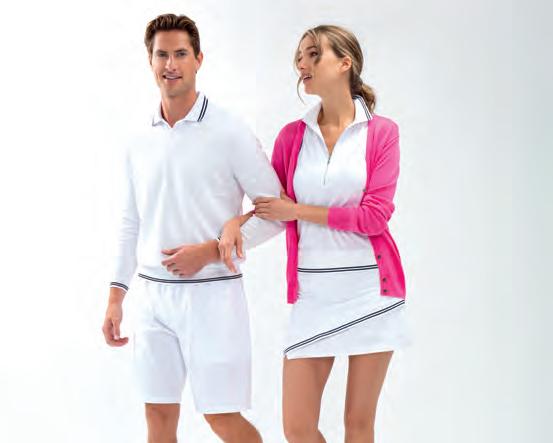

Personal attention is key. Some summer programs are victims of their own success and marketing. They take literally hundreds of players and use interim staff to coach the influx of kids.
It’s very difficult to give personal attention when a camp is very large. While it can be exciting to go to a famous camp with hundreds of players, that kind of scale is typically where many kids will fall through the cracks. Many camps offer four, five or six players per court and coach. Four players per court and coach is typical. That’s not bad—but it’s also not great. I prefer the Spanish approach with twothree players per court or coach. This way, the players get more attention from the instructor and get to hit more balls. The quality of the coaches is just as important. The head coach must train the coaches and supervise them well. This is almost impossible to do well if the camp is running dozens of courts. Smaller is typically better with a tightknit team and close supervision by the lead coach. With dozens of courts running and hundreds of campers, it’s clear that quality control will be a bigger issue.
Summer camp is supposed to be fun,
but it also must be demanding and challenging. Coaches need to be kind but exigent. Players who are serious need serious coaching and they need to be pushed. The greatness has to be extracted. The kids need to be challenged both on the court in their tennis and off the court in the gym. This approach gets the most growth and development out of the player in the least amount of time and makes for a more productive camp experience. Too often camps water down the summer experience and make it more of a holiday camp rather than a boot camp.
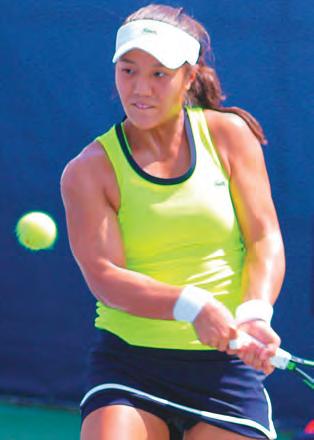
The Technical Instruction
Getting good technical and footwork
instruction is a must, especially if a camper is younger and still developing in those areas. Older and higher level UTR players may not need or want as much technical coaching—and that’s fine. Younger players or those with less experience, on the other hand, need help with their skills. Many academies gloss over technical and footwork flaws either because the coaches are not knowledgeable to fix them in a short amount of time, or the coaches simply don’t want the hassle.
Make sure to find a camp with a great technical guru on board—an experienced technical coach on staff who has expertise in building the technique and movement of developing
players. Watch out for camps that teach no technique and only focus on tactics. Watch out for camps that don’t train movement and footwork. Be wary of camps that are the opposite and hyper focus on technique above all else. Those types of environments can sometimes cause more damage than teaching no technique at all by making unnecessary changes and forcing kids to analyze their games in too much detail, paralyzing them during match play.
Tactical instruction is just as important as technical instruction and usually becomes the priority with older and higher level kids. Most parents, players and coaches looking at summer camps want lots of real match play and help with strategy by the coaching team. Camps should have time each day for actual set play—not just baseline points and modified games. Coaches should watch the matches and provide feedback both during and after play. Some camps are very good at providing this while other camps drop the ball. One of the best aspects of summer camp is access to a variety of different players and opportunity to play lots of matches. Camps should also offer summer tournament play, preferably onsite (see below).
The summer time offers an opportunity to improve fitness and prevent injuries. Unfortunately even some of the best academies in the world offer Mickey Mouse, lowest-commondenominator physical training programs in the summer. It’s such a shame and waste of valuable time. Parents, coaches and players should look for professionally run fitness programs lead by certified strength and conditioning coaches. One of the best certifications to look for is the NSCA’s CSCS designation—the gold standard in the industry.
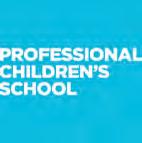

While many summer programs are beginning to recognize the importance of mental and emotional training, this area is tricky to work on at camp. Some programs are now offering a general classroom psychology education program during the camp week. Others like my own camp, prefer to work on this area of the game integrated into the on court tennis training and match play and off the court in the gym. It’s important to build character and develop mental toughness. Some camps neglect these areas completely.
continued on page 22
continued from page 21
Many summer camps look fantastic, but they don’t have indoor courts on site in case of rain. That is a HUGE problem if the weather is inclement during summer weeks. I have spoken with many parents who swear they will never send their kid to another summer camp without indoor courts because the rain risk is too great. Some players are also susceptible to sun and allergies outdoors. It’s great to have an indoor option for those players.
As mentioned previously, camps should have competition opportunities onsite or nearby for all the campers. Many camps offer verified UTR and other tournaments so that players can practice what
they have learned under pressure and build ranking or rating points. Tournament play and camp should go hand in hand.
It’s very upsetting for me to hear stories of players who attended summer camp and received very little follow up to continue the progress they made. What’s the point of learning new skills if the player forgets what they have learned in the weeks and months after camp? The best camps provide follow up and

even continued training opportunities year-round so that players can continue to refine what they have learned.
Many camps offer generic report cards that the staff fills out. These are usually hastily written and worth very little. The best camps offer comprehensive feedback for parents and work actively with the player’s home coaching team. Communication is key. The head coach should be available to talk about the player’s game and coordinate with the parent and home coaching team.

Chris Lewit is a former number one for Cornell and pro circuit player. He is a highperformance coach, educator, and the author of two best-selling books: The Secrets of Spanish Tennis and The Tennis Technique Bible. He has coached numerous top 10 nationallyranked players and is known for his expertise in building the foundations of young prodigies. Chris coaches in NYC and year-round at his high performance tennis academy in Manchester, VT, where players can live and train the Spanish Way full-time or short-term. He may be reached by phone at (914) 462-2912, e-mail Chris@chrislewit.com or visit ChrisLewit.com.
Play tennis year round under a Farley bubble. The Farley Group is the world leader in air-supported structures and has provided over 30 tennis bubbles in New York and Long Island. Contact us today to learn about how you can turn your outdoor courts into a year round facility.
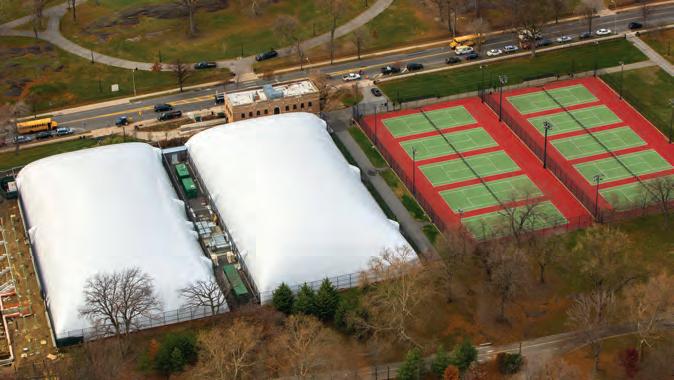
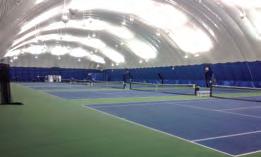
www.thefarleygroup.com l info@thefarleygroup.com
1-888-445-3223

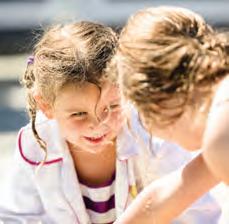
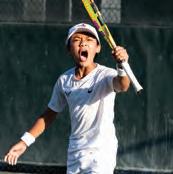
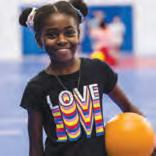




























































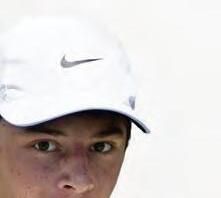










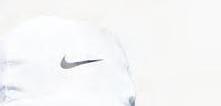
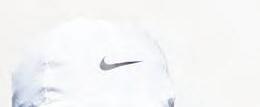






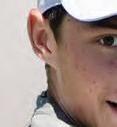





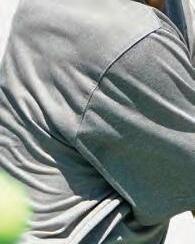

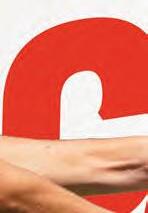


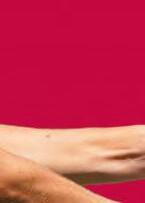
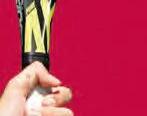
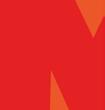









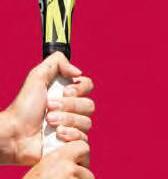
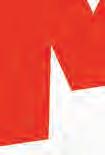
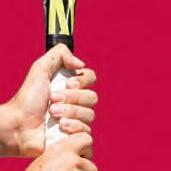








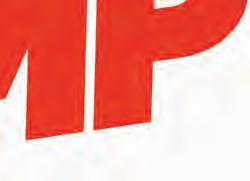
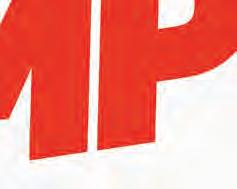













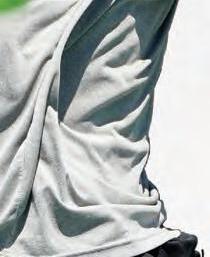






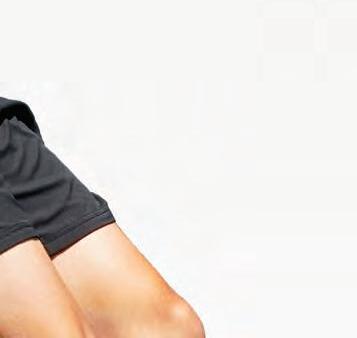


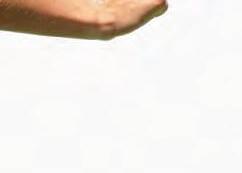




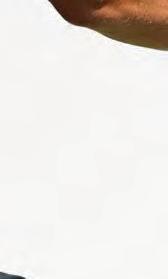




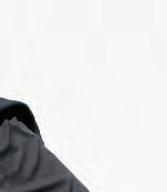

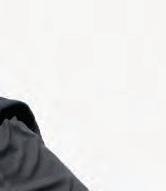









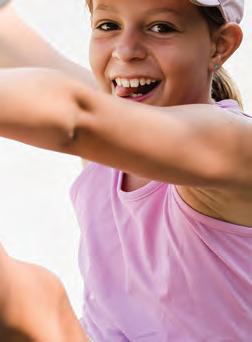





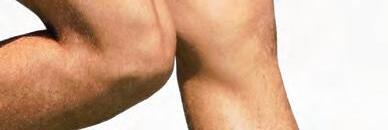

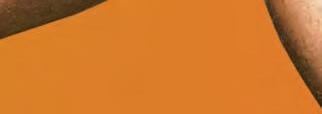
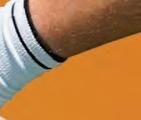








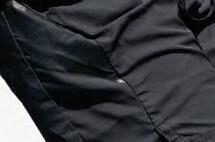
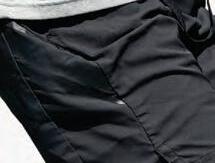
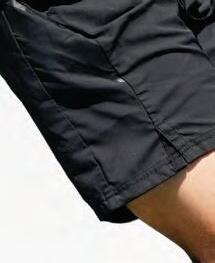
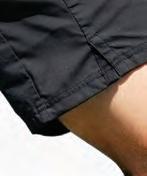
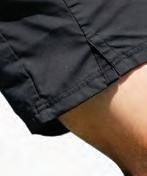




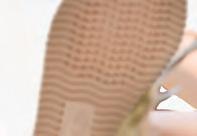


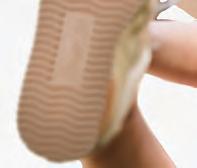

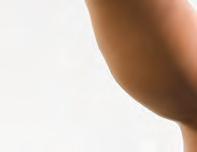







Startingthe year off strong. Leena Friedman, of Brooklyn, N.Y., defeated fellow Eastern player Sophia Holod, 6-1, 6-4, to lift the championship hardware in the girls’ 16s division at the USTA National Winter Championships, held December 28 through January 3 at the National Campus in Orlando, Fla.
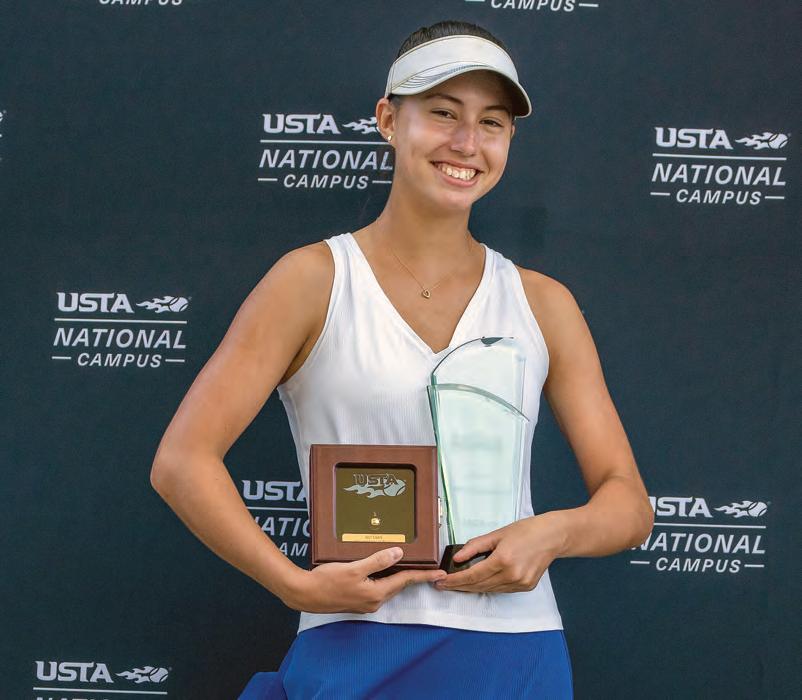
Friedman only dropped one set en route to capturing the title, against USTA Southern California’s Kenzie Nguyen in the quarterfinals. The key to her success? Not fixating too much on any potential outcome, she said.
“As much as winning the tournament felt amazing, I find the most joy in the process of continuous improvement,” Friedman explained. “It’s really nice to see the work I’ve put in pay off, but it doesn’t always happen that way. My focus is mainly on improving my game, and the matches will come.”
That mindset helped Friedman in her championship battle against Holod, of East Setauket, N.Y. After claiming the first
set, Friedman noticed that Holod began to lift her level and worked quickly to adapt to the situation.
“In the second set my opponent began taking control of some of the balls I hit too short, so to adjust, I made sure to run down everything and make her play one more ball every time,” she said. “I felt locked in throughout the first set, but [in the second] I had to make sure to stay focused on every point, not the end result.”
Perhaps one of the biggest challenges of the tournament for Friedman came one match earlier, when she faced her friend, fellow Eastern athlete and frequent doubles partner Summer Chandler, also based in NYC, in the semifinals. The pair recently won the girls’ 16s doubles title at the National Indoor Championships in November and finished as runners-up at the USTA Billie Jean King Girls' 16 & 18 National Championships in August.
“Summer and I have been friends since we were very young, and it is always hard to play your friends,” Friedman
said. “It was definitely tough mentally, but our friendship and partnership was strong enough to hug at the net afterwards.”
And just an hour after their battle against each other, Chandler and Friedman were on the same side of the court again to claim third place in the doubles draw.
“Summer is also a great tennis player, and she did an incredible job bouncing back when we played doubles together to win a [bronze] ball,” Friedman noted.
And that wouldn’t be the last of Friedman’s trophy haul in Orlando: In addition to claiming the championship in singles and a Top 3 finish in doubles, the New York City native also received a sportsmanship award for her conduct throughout the event.
“This tournament was an amazing experience,” she said. “I want to give a shout-out to the referees and tournament director who ran a great week of matches.”
Organizations in the Metro Region can apply for regional grant funding to support programming aimed at increasing tennis participation in the community. Special consideration will be given to: school and afterschool programming; junior competitive play; adult competitive play; diversity and inclusion initiatives; Community Tennis Associations (CTA) & National Jr. Tennis
and Learning (NJTL) Programs; special populations and wheelchair tennis programming; and innovative programming.
Regional grant awards are up to $1,000 and are for tennis programs and events operating in 2023. To learn more about eligibility requirements please visit USTA Eastern’s website.
Simmonds has been named the Regional Council Director of USTA Eastern’s Metro Region Council for the 2023-24 term. Simmonds previously served as the governing body’s secretary and has been involved with the council’s community efforts since 2017. She also regularly runs tennis programming for the Liber-T Community Tennis Association, based out of Detective Keith Williams Park in Queens.
Simmonds first picked up a racquet when she was just 12 years old in Jamaica and instantly responded to the sport. Later, she came to the United States to attend Queens College and chose tennis as an elective, which only increased her love of the game.
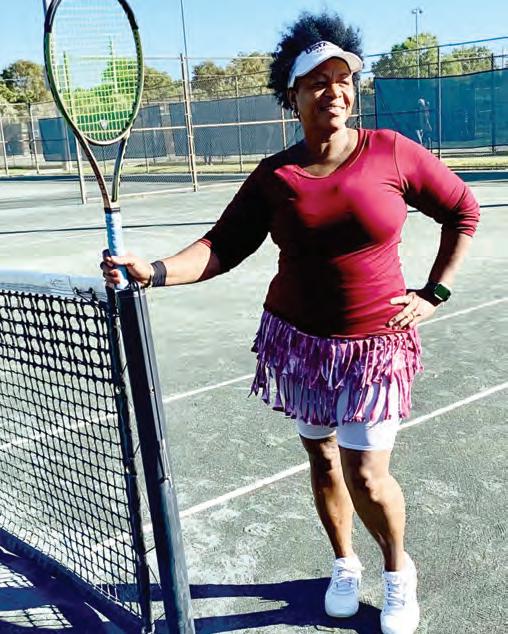
“It became an outlet for me,” she says. “It was how I released some stress, built camaraderie with friends and got some aerobic exercise. [I also knew] it was something I could play into my later years. So it became a passion.”
Spreading that passion will be a major goal for Simmonds as she leads the council over the next two years. She wants to work more with NYC-area schools to integrate tennis units into P.E. classes, as well as collaborate with local tennis facilities to create afterschool programming. She ultimately hopes these endeavors will help others discover the joy she experienced when she initially began taking lessons.
“Volunteering at local street fairs and seeing the enjoyment of individuals who are holding a racquet and trying out the game of tennis for the first time has been a highlight of my
time as a member of the Metro Region Council,” she says. “I want to create [more of these] opportunities for nonplayers. I want them to be able to access a pipeline to the game that includes equipment, facilities, and clinicians.”
Acutely aware that participation in the sport has increased fairly dramatically since the beginning of the pandemic, she also plans to offer more adult playing options across the region, like pop-up tennis parties and events.
“I want to contribute to the continued growth,” she says. “I am fully invested in promoting and growing the game among all different groups of players.”
Rounding out the Metro Region Council for the 2023-24 term: Jenna Anderson; Deb Andrews; Susan Cassidy; Jeffrey Fairbanks; Jonathan Gamberg; Charlotte Ganberg; Isis Gill; Jeffrey Lacy; Mark McIntyre; Julian Mignott; Steve Mingo; Gregory Muhammad; Doriana Noel; Rosa Oviedo; Sasha Thomas; Bill Wiese; and Ken Wilkinson.
FourMetro-area volunteers were honored for their work growing and promoting tennis at USTA Eastern’s Annual Awards Dinner, held Saturday, January 28 at the Sheraton Mahwah in Mahwah, N.J..
Ogbonna Chilaka was awarded the Umpire Service Award. Based in New York City, Chilaka has officiated several major events in the five boroughs, including the New York State Public High School Athletic Association Boys’ Team Championship, held at the USTA Billie Jean King National Tennis Center.
Steven Mingo, who was previously named the Clinician of the Year in 2021, received the Diversity & Inclusion Award. Mingo helps to coordinate the partnership between USTA Eastern and the Mayor’s Action Plan, an initiative that brings tennis programming to New York City housing developments. The Metro Region Council Bronx delegate was also recognized for his work starting a summer tennis camp in Jamaica.
Allon Lifshitz was honored with the Special Service Award. Lifshitz was a longtime member of the Metro Regional Council, serving as the governing body’s secretary from 2013 to 2014. For the last four years, Lifshitz chaired USTA National’s Constitution & Rules Committee.
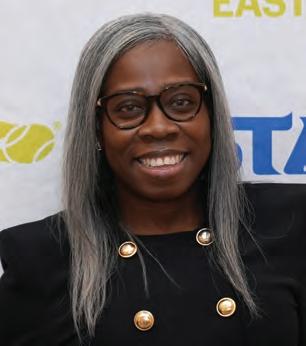
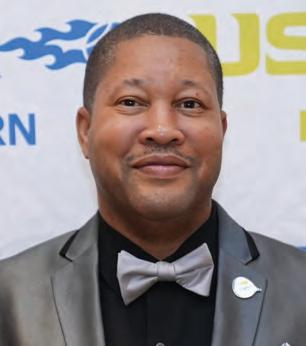
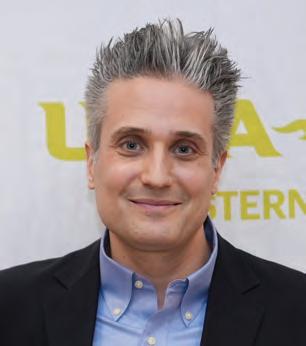
Sasha Thomas received the Metro Region Volunteer of the Year distinction. Thomas helped organize a “Thank You to Essential Workers” tennis clinic and regularly dedicates her time to teaching the sport at street fairs in the city.
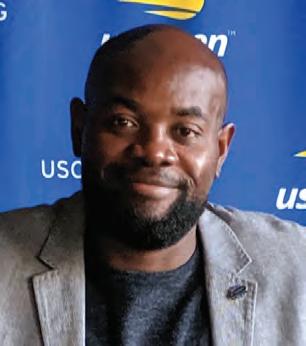
Tennis players have always been ranked regionally, nationally, and internationally dependent on their age and tournament results. More recently, new rating systems have been developed to further understand the level of different players without necessarily even watching them play.
Universal Tennis Rating (UTR) is arguably the most accurate system as it uses the most advanced algorithm to differentiate the level of players based on their results. Its mission is to have players compete worldwide at their level, regardless of age and gender.
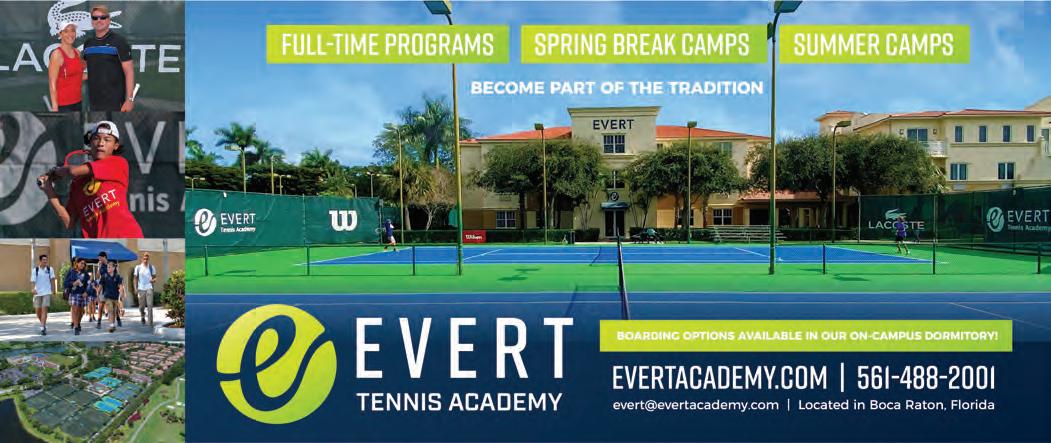
The pros and cons of UTR or other rating systems are as follows:
Pros
l Identifies a players’ level, regardless of location, so that players can register for level appropriate tournaments and practice sessions
l The more matches one participates in, the more accurate their rating becomes
l Provides a great way to track one’s progress over a period of time – 3-
6 months and beyond
l Motivates players to have long term goals that they can work to achieve
Cons
l Hyper fixation on achieving a higher UTR or rating over a short period of time by parents and or players
l Tendency to become overly concerned about improving UTR rating as opposed to the development of a players’ actual game
l Players defining themselves by rating and thinking they should no longer practice with other players of even slightly lower ratings
l Players expecting wins and losses based on ratings and, as a result, do not believe in potential victories or upsets
In conclusion, rating systems and, more specifically, UTR, are the best way to get to know a player that you’ve never seen play tennis. However, the most negative characteristic about any rating system is that it tends to make players lose
sight of what is actually important, especially in practice.
Unfortunately, most players that I see in tournaments and on the practice courts are so focused on UTR ratings, that they actually believe practicing with a lower rated player is meaningless. Tennis is a sport where you have to compete with yourself every day in practice so that you are ready to beat other players in matches. Competing with yourself and improving your game have little to do with who is on the other side of the net. The best professional players in the world practice with juniors and players ranked much lower than them, and still find ways to improve.
Rating systems, such as UTR, happen to be excellent additions to the modern tennis game, but they do have to be used properly. Players and parents need to understand that a player’s rating is a solid indicator of one’s level, but it does not define a player and should not be used in a vacuum. Tennis players should ultimately focus more on themselves by improving their games and competitiveness, rather than focusing on the results and ratings of others.
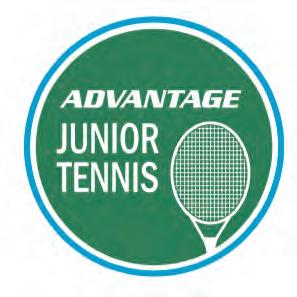
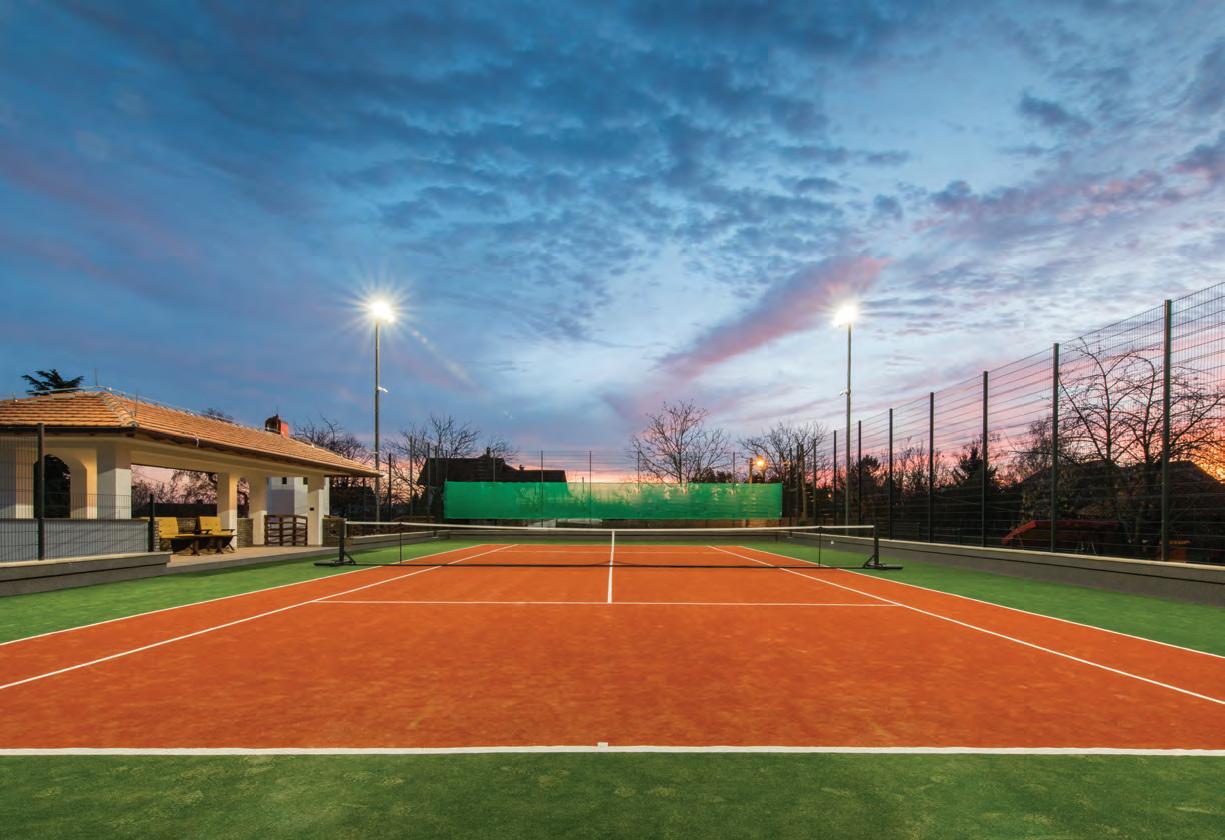
EAST SIDE: Roosevelt Island Racquet Club (RIRC) 281 Main Street l Roosevelt Island, N.Y. l Contact: Mike Barbato l (212) 935-0250
WEST SIDE: Manhattan Plaza Racquet Club (MPRC) 450 West 43rd Street l New York, N.Y. l Contact: Gabe Slotnick l (212) 594-0554

AdvantageCamps.net

Advantage Junior Tennis Camp is “tennis heaven for kids”–giving players ages seven to 17 more drills, more skills and more time on the courts!
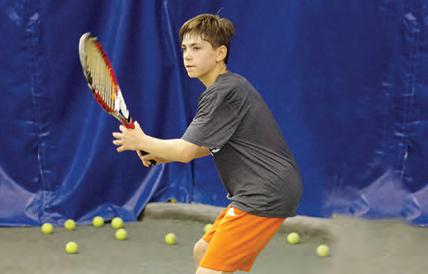
Directed by Xavier Luna, it’s the City’s oldest and most-established junior tennis program. Girls and boys learn from a team of pros—including some of the finest coaches in the East. Campers use 12 HarTru indoor courts and three outdoor courts to improve their game with instruction, match play and cross-training. And if you’re looking for more tennis instruction, we can arrange a private lesson with the RIRC coach of your choice during your Camp week. While the focus is on tennis, campers go swimming, too!
Choose single or consecutive weeks—and ask about the sibling discount! We even offer individual days with our 10-, 20-, 30-pack option. Camp is at Roosevelt Island Racquet Club, easy to get to by tram, ferry, subway or car and Manhattan Plaza Racquet Club on West 43rd St.
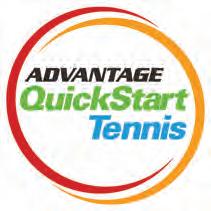
West Side: Manhattan Plaza Racquet Club
450 West 43rd Street l New York, N.Y. l Contact: Gabe Slotnick l (212) 594-0554, ext. 20
East Side: Roosevelt Island Racquet Club
281 Main Street l Roosevelt Island, N.Y. l (212) 935-0250
Upper East Side: Wagner Middle School
220 East 76th Street l New York, N.Y. l Contact: Darrin Fallick l (646) 884-9648 l
AdvantageCamps.net
Advantage QuickStart Tennis Camp delivers a super summer for kids ages four through eight, with tennis customized for age, ability—and fun! During half days from 9:00 a.m.-noon, campers love playing with smaller rackets and slower-bouncing balls that make the game accessible. Engaging drills and games mean there’s always something new to learn and enjoy. Camp is led by an all-star tennis pro who specializes in teaching kids. And our coaches receive intensive specialty training in teaching the Net Gen 10 & Under curriculum. Enrolled campers also benefit from free unlimited Play More Sessions that make practice fun and Athletic Zone Sessions that help develop agility, balance and more. Choose only the weeks you need– and the more you choose, the lower the weekly rate!

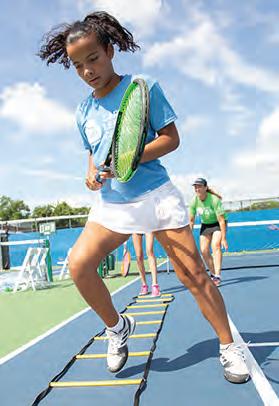
1720 Crotona Avenue l Bronx, NY l (718) 247-7420
caryleedsinfo@nyjtl.or g l caryleedstennis.org
Summer Camp at the Cary Leeds Center
The Cary Leeds Center for Tennis & Learning offers Summer Camp for juniors ages five to 18 years old. All levels are welcome from beginners in the development level program to advanced players in the high performance level program. Players will train to develop necessary tennis technique, improve consistency and create basic patterns of play for effective point construction. Included is a fitness component designed to improve players’ footwork, balance, speed and overall strength. Camp hours run from 10:00 am to 4:00 pm.
NYJTL Community Tennis Program
The Cary Leeds Center is the flagship home of New York Junior Tennis & Learning and offers free programming as a part of its commitment to the community. The summer Community Tennis Program is coming soon! NYJTL offers free programming throughout all five boroughs. Please check our website, nyjtl.org to find a location near you. NYJTL’s mission is to develop the character of young people through tennis and education for a lifetime of success on and off the court. All proceeds from the Cary Leeds Center fund its mission.
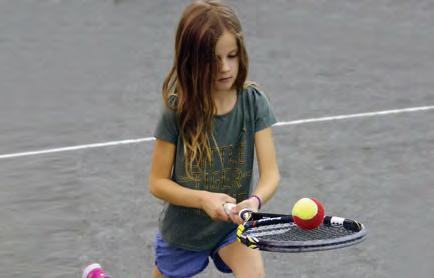
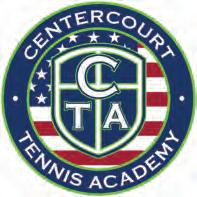
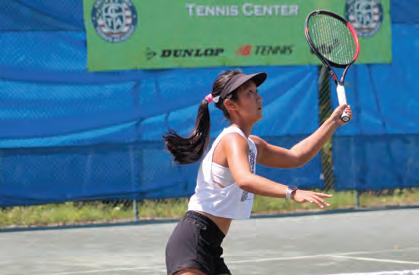
Offered Weekly, Annually and for Specific Periods required
Chatham l Florham Park l Gillette l Marlboro
Just 25 miles from Manhattan
(862) 308-3029 l Centercourtcta.com l Conrad@Centercourtclub.com
Our commitment to Excellence at Centercourt Tennis Academy has earned our reputation as the Toughest Playground in the Northeast. With a passion for Elite Player Development and with a dedicated HighPerformance Team as well as our multiple World-Class facilities from Indoor and Outdoor Clay & Hards to our Strength and Conditioning Institutes.
Our players experience Only the Best in Competitive Training and an array of Tournaments and Events in one Academy. Based just 25 Miles from Manhattan Players come from International as well as the Tri - State area. We offer Additional Homestay and Transportation Options upon request.
The Centercourt Tennis Academy Points of Difference
l World renowned International Tennis Coaches on Court daily in our innovative environment
l Attention to detail allows athletes to improve in multiple dimensions: Technical, Tactical Fitness, Emotional & Mental
l Centercourt’s list of events including USTA, ITA & official UTR tournaments provide opportunities for athletes to compete weekly and improve UTR ratings quickly.
l Centercourt is dedicated to meeting the individual needs of each one of our players
l Centercourt’s players results are amongst top National rankings and the ITF100 ranked players. Our Alumni are competing ay Ivy League as well as top Colleges all over the country.
l Centercourt puts the needs of the player first, in a development-focused model of training
l Athletes are grouped in level by UTR; featuring small group training, match play, individualized fitness plans, Mental Toughness Training and On the Spot video analysis.
l Tournament Support, Supervised Practice Sets and Team coaching are all available.
l Our Environment shows our commitment to develop players Holistically - we believe in shaping people from the Inside Out and guide our team in our Team based Academy setting.
Centercourt Tennis Academy's Proven Superior Player Development Model has seen countless outstanding results achieved in recent times. With our athletes competing at Top Colleges around the nation we are confident in our ability to bring your Childs Ability to their potential .
Centercourt Tennis Academy offers programs with rolling admissions year-round and Summer Camp from June 12 –September 1, 2023.
Annual Full Time Academy with Academics commenced Tuesday, September 5th, 2023.
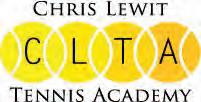
Manchester, Vermont l (914) 462-2912 l ChrisLewit.com l Chris@ChrisLewit.com
No Rainouts Ever! We have indoor courts onsite. Train seriously in the picturesque green mountains of Vermont!
Come train personally with elite coach Chris Lewit, who has recently developed several junior players to #1 nationally!
Chris Lewit Tennis Academy (CLTA) Summer Camp is a serious high performance sleepaway and day camp set in the natural paradise of Vermont. In addition to the summer program, Chris Lewit Tennis Academy also offers year-round training—with boarding—both short term and long term!
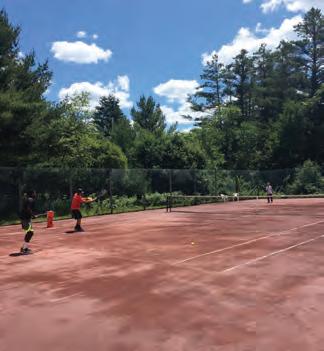
Players at CLTA have the opportunity to train personally in very small groups with Chris Lewit, one of leading high-performance junior development coaches in the United States. Chris is known as an expert in technique and biomechanics, and in Spanish training methods. Chris wrote the best-selling book, Secrets of Spanish Tennis, and he is currently pursuing an advanced degree in kinesiology and biomechanics. He has coached numerous top 10 nationally-ranked juniors, many of whom are now graduating to the pro circuit. He also has extensive experience building the foundations of many young prodigies.
The camp focuses on players from ages 8-18, from serious beginner to national and ITF ranked players, and offers day or full boarding options. Campers live in a charming Vermont Inn and have exclusive use of a private tennis club, CLTA Vermont, which offers both outdoor red clay courts and indoor hard courts in the event of rain, gym, yoga studio and clubhouse, all set on 15 picturesque acres with a majestic river for swimming onsite.
The camp features daily morning yoga and mindfulness training from a certified master yoga instructor and an injury prevention program overseen by a NSCA certified strength and conditioning coach from NYC.
CLTA offers a unique hybrid teaching system based on the Toni Nadal, William Pato Álvarez, and Bruguera
Methods from Spain, as well as other European influences based on Chris Lewit's travels abroad. Chris has spent the last 15 years studying with many of the legendary coaches in Spain and Europe. Recognized as a worldleading expert in Spanish systems, he is the only coach in the US certified in three distinct Spanish styles: Nadal, Bruguera, and Álvarez. Chris brings the most cutting-edge training methods from Europe back to the U.S. for his students.
CLTA summer camp features a new character building and mindset training based on the teachings of Toni Nadal!
All students receive personal coaching and mentoring directly from Chris Lewit, and are supported by his highly trained staff of top college and ATP players.
This summer, the academy will host a full series of UTR tournaments and UTR Pro Money event featuring players as high as 200 ATP!
For more information, contact Chris directly to discuss your player's summer development plan by e-mail at Chris@ChrisLewit.com, or text/call/WhatsApp (914) 462-2912, or visit ChrisLewit.com.
You can also learn more about Chris’s philosophy at Youtube.com/ChrisLewit or check out his Prodigy Maker Show and podcast. Visit ProdigyMaker.com for his blog and show links.
(home of the High Performance program)
156 West Main Street l Bogota, N.J. l (201) 366-2898
195 County Rd. l Tenafly, N.J. l (201) 254-5836
CourtSense.com l Info@CourtSense.com
With CourtSense, you’ll achieve your personal best, because our training is of the highest professional caliber and easily tailored to suit your age and skill level. We use tennis as a vehicle to teach life lessons by tapping into the spirit of every player, with lots of passion, expertise and character. Students have access to 17 outdoor and 16 indoor tennis courts, so regardless of the weather conditions the players are guaranteed their practice sessions.. High Performance Summer Tennis Camp at Bogota Racquet Club. This camp is geared towards High Performance Tournament and high-level High School players for UTR level 4 and above and age group 11 and older. CourtSense has trained and is currently training players who have become ATP- and WTA-ranked players, U.S. Olympians, as well as many college scholarship athletes. CourtSense’s International High-Performance Coaches, in collaboration with the fitness staff and a sports psychologist, have developed a program that maximizes all athletes’ strengths, both on and off court.
l Full Day High Performance Tennis Camp at Bogota Racquet Club runs from Monday-Friday, June 26-Aug. 25 (nine weeks), featuring 10 hours of tennis training; 5 hours of fitness and 8 hours of match/point play) for players ages 11 and older, and UTR level 4.00 and above. Campers will have access to outdoor and indoor hard and clay courts, with a 3:1 student-to-coach ratio. Weekly dual matches with other academies, and mental toughness training are also included. Evaluation is required prior to enrollment. Transportation service between locations is provided.
l Full Day Performance Tennis Camp at Tenafly Racquet Club runs from Monday-Friday, June 26-Aug. 25 (nine weeks), featuring 8 hours of tennis training; 4 hours of fitness and 6-8 hours of match/point play) for players ages 8-12, and UTR level under 4.00. Campers will have access to a premier and very unique facility where they will be able to experience playing on all grand slam surfaces (European red clay, grass, hard court), with a 3:1 student-to-coach ratio. Mental toughness training is also included. Evaluation is required prior to enrollment.
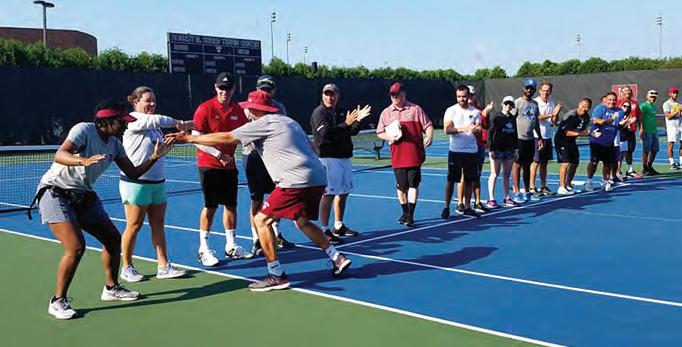
(813) 684-9031 l CollegeTennis.com
l USTA National Campus, Lake Nona, Fla.: Saturday-Sunday, June 3-4

l Lehigh University, Bethlehem, Pa.: Saturday-Sunday, July 15-16
l Mercer County Park Tennis Center, Windsor, N.J.: Saturday-Sunday, July 22-23
l Harvard University, Cambridge, Mass.: Saturday-Sunday, July 29-30
l University of Colorado, Boulder, Co.: Saturday-Sunday, August 12-13
Coach Ed Krass' 35th Annual College Tennis Exposure Camp & Clinics, for ages 14-18, are taught exclusively by head college coaches who will work with you on-court to improve your singles and doubles match play strategies and provide college recruiting advice. Instructional drills and match play competitions will be conducted in the same style and intensity as a college team practice. Coach Krass' camps are still the world's only tennis camps taught exclusively by all head college coaches!
The two-day College Tennis Exposure Camp will be offered at the USTA National Campus in Lake Nona, Fla., Saturday-Sunday, June 3-

4; Lehigh University, Bethlehem, Pa., Saturday-Saturday, July 15-16; Mercer County Park Tennis Center, Windsor, N.J., Saturday-Sunday, July 22-23; Harvard University, Cambridge, Mass., Saturday-Sunday, July 2930; University of Colorado, Boulder, Co., Saturday-Sunday, August 12-13.
Coach Ed Krass, Founder and Director of College Tennis Exposure Camp & Clinics, has coached varsity tennis teams at Harvard University, Clemson University and the University of Central Florida prior to founding the College Tennis Academy. For more information, call Coach Krass at (813) 684-9031 or visit CollegeTennis.com. Look for more camp locations at CollegeTennis.com.
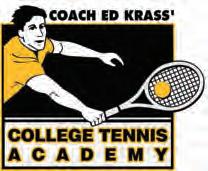
10334 Diego Drive South l Boca Raton, Fla. l (561) 488-2001
EvertAcademy.com l Evert@EvertAcademy.com
The Evert Tennis Academy is located in sunny Boca Raton, Fla., and is considered by many as one of the best tennis camps in the country. John and Chrissie Evert set out to continue their father’s legacy 22 years ago by installing core values: Excellence, Resilience, Integrity and Leadership. “Our core values are the roadmap to coaching every student-athlete towards reaching their full potential.”–John Evert
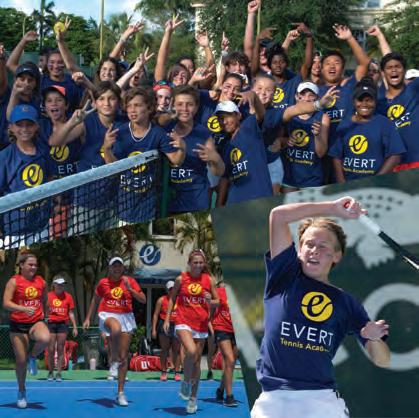
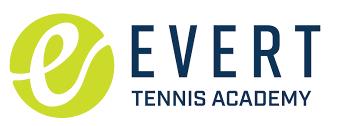
Evert Tennis Academy clinics will focus on technical development, tactical training and competitive settings. Players will experience a typical Evert program that includes tennis lessons, strength and fitness conditioning, mental conditioning and competitive match play against players from all over the world. Players will get a coach’s evaluation during their stay here to review at home.
Top four reasons why to attend this summer (Monday-Sunday, May 28Aug 18):
1. Coaches/program: Our coaching staff continues to put a program together that is second to none. Each program is designed so that each player will get the personalized attention needed to improve his or her game while having fun. Whether you are an intermediate player looking to fine tune your game or a high-level nationally ranked player we have the program for you.
2. Facility/boarding: Evert Tennis Academy is one of the only academies to provide boarding services for any student wishing to stay only steps away from the courts. Its eight-acre facility provides a safe environment nestled in the beautiful and secure Mission Bay residential neighborhood, surrounded by lakes, manicured lawns and lush Floridian foliage.
3. Competition: The Evert Tennis Academy provides match play for each student every day and all levels are welcome. Although the tournament schedule is not yet confirmed, we normally host three UTR tournaments throughout the summer for any player looking to get match play prior to the Clay Court & Hard Court Nationals, Zonals or just get access to players of equal playing level.
4. Family Oriented and Personal: The Evert Tennis Academy in known worldwide for a family oriented atmosphere and a place where players enjoy both on-court training and off-court activities. Students that choose the Developmental Program will receive a taylor made personalized program that is second to none in the industry.
5. Location: Located in the beautiful town of Boca Raton, Fla., the Evert Tennis Academy is located only a few minutes away from the beach and only 30 minutes away from the Fort Lauderdale and West Palm Beach airports making it an easy trip from the northeast.
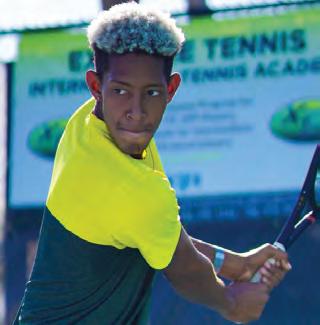

18900 NE 25th Ave. l Miami, Fla. 33180 l (786) 290-1546
ExtremeTennisAcademy.com l ExtremetTennis Academy@Outlook.com
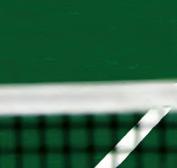
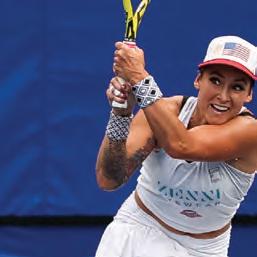
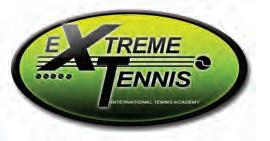
Extreme Tennis Academy Summer Camp 2023 is the best place for you to take your tennis game to the next level this summer!
Camps are available for kids eight-years-old and older. The High Performance Tennis Camp is run by Freddy Azucey and Carlos Maehama and their dedicated staff of top coaches.
Azucey is a PTR & Competitive Junior & Professional development coordinator, Dominican Republic Davis Cup, Former ATP/ITF Circuit Player who faced opponents such as Hernan Gumy & Wayne Ferreira among others, and helped develop Junior and Professional Players such as: Eddie Herr Winner Roy Lederman (USA) #1 National, Gabriela Paz (VEN) Top 10 ITF and US Open Junior Finalist, Adriana Perez (VEN) ITF 21, Sofia Melikishvili (GEO) WTA 250. Maehama is an Academy Director, PTR International tester – former Japanese Junior team Traveling Coach & National Coach, USTA Junior Team Tennis Coordinator (North Miami Dade), and has helped develop numerous College and Junior players, as well as Finalist of French Open Mariano Puerta, PTR International Tester, is also fluent in Japanese, Spanish, and English.
Housing is available for players traveling to the camp. Sign up by May 31 to receive 20 percent off.
Come train with the best tennis camp in South Florida! Visit ExtremeTennisAcademy.com for more information, see you on the courts!
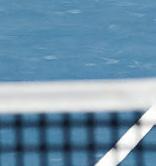
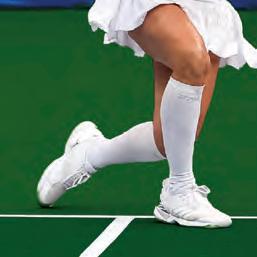
Engineered with the sam around the world, our ac high-performance playin
e precision and quality as Harcrylic hardcourts deliver a cons g surface.

All-weather Har-Tru Spo pigments in a range of v our coatings offer high y
rts Coatings feature UV-resista ibrant colors. Designed to appl ield application rates and long

Tru tennis courts istent, durable,
nt, 100% organic liquid y consistently and evenly, -term surface stability.
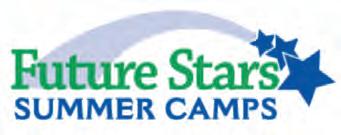
(914) 273-8500 l FSCamps.com
l Purchase College SUNY
735 Anderson Hill Road Purchase, N.Y. (914) 273-8500
l The College at Old Westbury
223 Store Hill Road Old Westbury, N.Y. (516) 226-CAMP (2267)
l Farmingdale State College
2530 Broadhollow Road Farmingdale, N.Y. (631) 769-CAMP (2267)
l Future Stars Tennis Club
1370 Majors Path Southampton, N.Y. (631) 287-6707
l St. Joseph’s College-Patchogue
155 West Roe Boulevard Patchogue, N.Y. (631) 572-0232
l Aspatuck Tennis Club
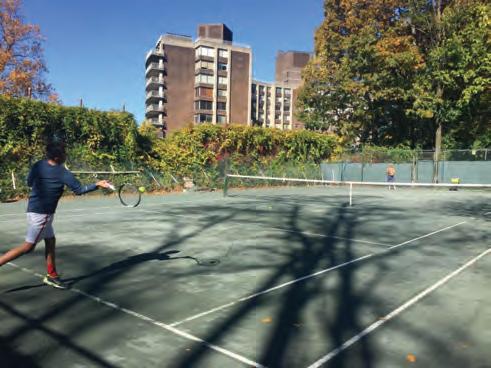
25 Howell Lane, Westhampton Beach (631) 287-6707
Future Stars Summer Camps offer the finest weekly tennis day camps at five outstanding locations: Purchase College SUNY, The College at Old Westbury, Farmingdale State College, St. Joseph’s College-Patchogue and Future Stars Tennis Club in Southampton, N.Y. Programs are directed by experienced and qualified teachers and coaches who share a passion for working with children. Weekly programs are offered for boys and girls entering grades K-12.
Tennis camps offer the perfect mix of match play, drill work, strategy sessions and off-court activities to challenge players of all levels. The program is designed to improve every facet of the game, including technical, tactical, physical and mental components under the guidance of our experienced and enthusiastic tennis professionals.
Campers will be carefully grouped according to skill level and age and will be encouraged to enhance their strokes and strategies via group lessons, skill building drills organized play, target training, fitness routines and more.
At Future Stars Summer Camps, we play with confidence, enthusiasm and a genuine love of the game! Go to our website for more information and take advantage of enrollment savings. fscamps.com
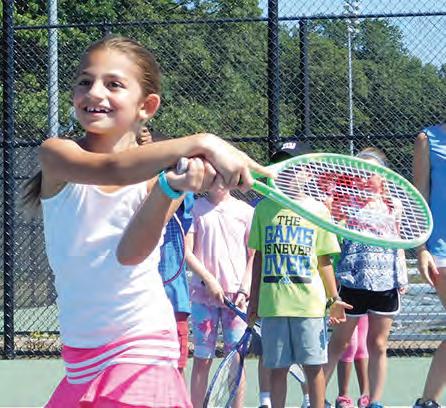
Riverdale Tennis Center l 3671 Hudson Manor Terrace l Riverdale, N.Y.
The Gilad Bloom Summer Camp begins on Monday, July 10 and runs four times a week, Monday-Thursday, for 10 weeks until Thurs, August 31.
Gilad Bloom Summer Camp’s Group Sessions will run from 2:00 – 4:00 p.m.
Gilad Bloom Tennis also provides:
l Private lessons and match play available before and after the group session.
l Fitness sessions before or after the group.
Tournament travel available seven days a week. Come learn and train under Gilad Bloom and his program which enters its 20th year. Bloom played on the pro circuit for 12 years and reached a career high singles ranking of 61st in
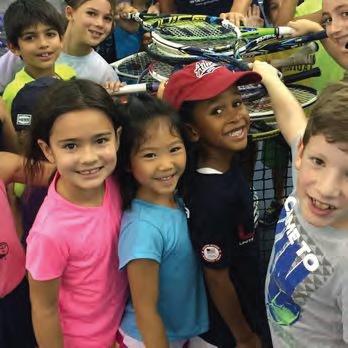
the world and reached the U.S. Open fourth round in 1990. Bloom scored victories over Jimmy Connors, Petr Korda, Brad Gilbert, Mark Philliposis and Marcelo Rios among others during his career, and represented Israel in Davis Cup for 11 years and is a two-time Olympian (1988,1992).
For more info please go to GiladBloom.com.
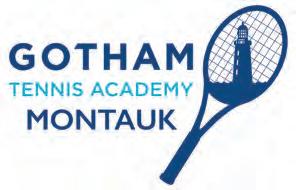
91 S. Fulton Street l Montauk, N.Y.
(631) 267-8525 l www.GothamTennisMTK.com l Info@GothamTennisMTK.com
For over a decade, Gotham Tennis Academy has become known for innovative, worldclass-tennis instruction in NYC and the Hamptons. Gotham Tennis – Montauk is on a beautiful nature preserve with eight pristine clay courts, just minutes from the center of Montauk and its world famous attractions and beaches. Beginners, rising stars, recreational players, and tournament players are all welcome.
Camp Hours: Weekdays from 10:00 am – 3:00 pm (Half Day Option : 10:00 am12:00 pm or 1:00 pm – 3:00 pm)
Campers are grouped according to age and level and can expect to improve fundamental tennis skills, self-confidence and conditioning and hopefully build on a lifelong love of the sport of tennis. One of our paramount goals throughout the summer is to build confidence and keep all campers active and motivated, so that they continue to learn at the fastest possible pace. Our camp staff with international backgrounds excels at teaching junior players of all levels. Your child can expect to not only improve tennis skills, but also life skills, such as discipline, the value of hard work, sportsmanship, independence and mental toughness.
Whether your child is a Beginner or Advanced level player, he or she will gain confidence and learn appropriate tennis fundamentals, strategy, match play, conditioning, and footwork, while having tons of fun during the camp sessions. And maybe most important of all, your child is sure to develop memories and relationships that will last a lifetime!
Minutes From Manhattan Next to Yankee Stadium
(718) 665-4684 l www.StadiumTennisNYC.com l Reservations@StadiumTennisNYC.com
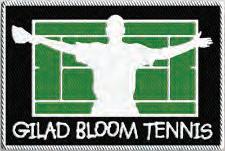
Stadium Tennis Center offers a unique array of summer camp programs designed for tennis players of all levels to experience.
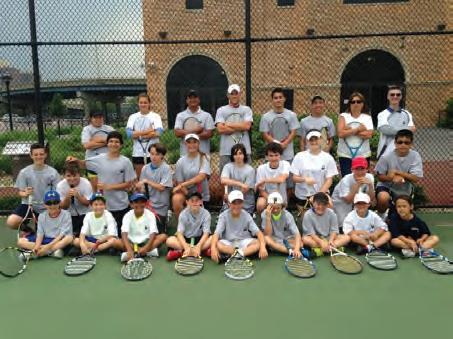
Through our partnership with Gotham Tennis Academy, a leading operator of innovative tennis programs and camps in NYC and the Hamptons, some of the most talented and engaging tennis pros in New York City have been assembled. Our pros share a passion to work closely with players of all levels and ages to help them develop to their fullest potential.
Gotham Stadium Red and Orange Ball Junior Summer Tennis Development Program (Ages 5-10): Designed for beginner, intermediate and advanced players. A great way to keep your child active and improve his or her tennis in a fun and supportive environment. The camp is designed to take your child to the next level towards tennis proficiency in our fun and supportive environment. Certified tennis instructors with international backgrounds excel at teaching junior players at this
formative stage of development. Your child will not only have lots of fun, but also gain confidence, learn appropriate tennis fundamentals and make new friends.
Gotham Stadium Summer Elite Yellow Ball High Performance Tennis Academy (Ages 7-15): Designed for those juniors who aspire to become more competitive tournament players and prepare them for more competition and advanced play. On-court drills, match play, conditioning and mental toughness training fitness will prepare your child for the next level of advanced play. If your child is ready to reach for new heights on the tennis court, then you owe it to yourself to experience high performance summer training at the Stadium Tennis Center. Your child will learn proper stroke production fundamentals, strategy, match play, conditioning and footwork.
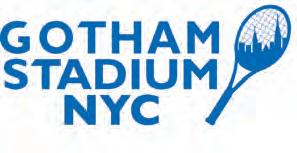
We have a flexible enrollment policy with full and half day options all summer long. Round-trip door-to-door transportation from points in New York City, Westchester and New Jersey may be arranged.
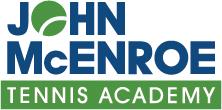
Locations on Long Island including the Hamptons, in Manhattan and Westchester:
JMTA New York City l SPORTIME Randall’s Island l (212) 427-6150
JMTA Long Island l SPORTIME Syosset l (516) 364-2727
JMTA Hamptons l SPORTIME Amagansett l (631) 267-3460
JMTA Westchester l SPORTIME Lake Isle l (914) 777-5151
CampsNYC@SportimeNY.com l SportimeCamps.com/JMTA
No one knows junior tennis training better than SPORTIME! And, with multiple tennis camp locations across Long Island, including in the Hamptons, and in New York City and Westchester, aspiring tennis players can enjoy John McEnroe Tennis Academy and SPORTIME tennis training programs throughout the region, this summer.
SPORTIME’s and JMTA’s training methods are fun and fastpaced featuring both technical and tactical training. Our innovative tennis training approach is rooted in competitive games, underpinned by technical development and tennisfocused athletic development. Newer players quickly learn skills and develop an understanding of tennis as a game in age and level appropriate groups. More experienced juniors receive enhanced training to prepare them for the physical, mental and emotional demands of match and tournament play. SPORTIME’s international coaching staff is dedicated to turning weaknesses into strengths and strengths into winning games.
For our youngest players, ages 10 and under, campers work through clearly defined stages of development that follow an internationally accepted progression of court sizes and balls that make it possible for kids to play tennis from the moment they step onto the court. With our fun and unique “gamification” approach, our junior players don’t just take lessons—they go on missions, acquire skills, collect points and achieve milestones. Campers also enjoy instruction and competition in a variety of team sports activities.
Visit SportimeCamps.com to find the SPORTIME EXCEL or JMTA Summer Tennis Training Camp nearest you, or e-mail CampsNYC@SportimeNY.com to find out more. Programs vary by location.

2781 Shell Road l Brooklyn, N.Y. l (718) 769-0001
MatchPointComplex@gmail.com l MatchPoint.NYC/Camp

The most immersive, joyful, and thrilling Summer sports experience in Brooklyn is back this summer at MatchPoint NYC! We are excited to make our club your child's second home this summer, as well as to help them make new friends & develop long-lasting friendships with other participants.
Our Tennis, Swimming, & Rhythmic Gymnastics Full-Day Programs help young athletes learn, excel, and master the sports they're devoted to. For those who are not devoted to a single sport, we offer a Multi-Sport Full-Day Program, that introduces kids to a wide range of sports, including tennis, soccer, basketball, boxing, swimming, and more!
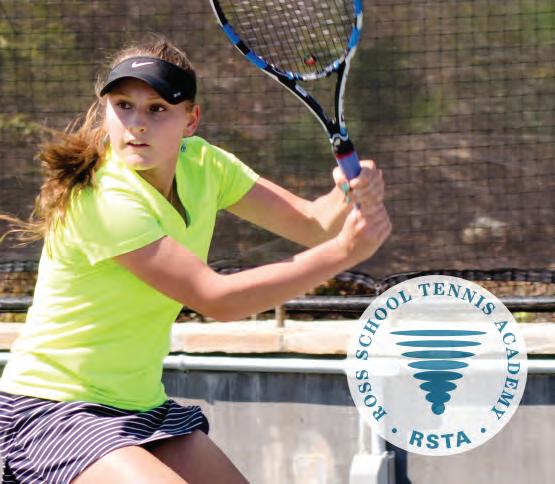
Each Full-Day Summer Program is run & coordinated by professional, certified coaches who are devoted to the safety and athletic development of each participant. Each program includes drills, match play, and fitness sessions, along with healthy lunches served each day. Snacks & plenty of water are also provided keep our athletes energized to play their favorite sports. MatchPoint NYC is the sports and fitness destination for the entire family. It is located in Brooklyn - just 20 minutes away from downtown Manhattan. Spread across 120,000-square feet, MatchPoint NYC’s premier health and fitness complex features a cutting-edge tennis facility that includes eight gorgeous indoor tennis courts.
Additional features include full-sized gyms for weight lifting, cardio, and CrossFit training, three group fitness studios, a Junior Olympic pool, a rhythmic gymnastics center, a basketball court, yoga studio, and a variety of youth & adult competitive & recreational training programs.
For more information about MatchPoint NYC and its Full-Day Summer Programs, visit matchpoint.nyc/summer-camp or call (718) 769-0001.
Let us help you find your game. Sign up today!
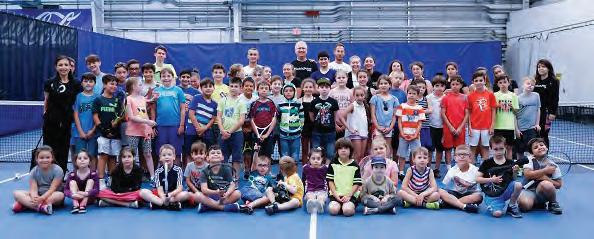
20 Goodfriend Drive l East Hampton, NY l 631-907-5162 ross.org/tennis l tennisacademy@ross.org
Ross School Tennis Academy (RSTA) is a beautiful tennis facility in the Hamptons that is open to the public and located on the Ross Upper School campus in East Hampton, NY. The tennis center features six Har-Tru courts that are enclosed by a bubble from mid-fall through mid-spring, allowing for yearround play. There are also two hard courts for junior tournament training. The courts are directly adjacent to a state-of-the-art Field House, featuring amenities such as locker rooms, lounge, snack bar, and ping-pong tables. The staff here provides a fun and supportive atmosphere that allows for the greatest amount of success.
Summer Tennis Academy
Monday–Friday, June 26–August 18: From specialized U10 programs with orange and green dot balls designed for developing competitive tennis players to our high-performance training with live ball drills and match play series for players entering middle and high school, this 8-week all-encompassing summer program is our most intense and complete junior tennis education offered and is considered the best in the Hamptons. Legendary tennis coach Larri Passos will join us again this summer to work on-site with players. Players considering the program should be serious about their commitment, consistently practicing at least three days per week year-round. All training in each age and development level includes daily fitness, match play, and gourmet lunch from our renowned café. Players ages 6–16 can sign up for this weekly, but space is limited. Tryout required (videos accepted). Boarding is available select weeks for Grades 7–12. Visit ross.org/summer for more information.
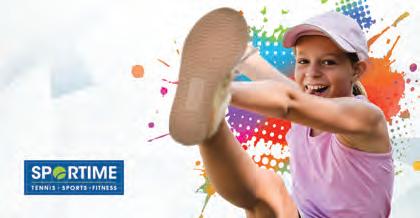
Locations across Long Island, in Manhattan and Westchester and in Schenectady:
SPORTIME Bethpage l (516) 933-8500
SPORTIME Kings Park l (631) 269-6300
SPORTIME Lynbrook l (516) 887-1330
SPORTIME Quogue l (631) 653-6767
SPORTIME Randall’s Island l (212) 427-6150
SPORTIME Roslyn l (516) 484-9222

Camps@SportimeNY.com l SportimeCamps.com
SPORTIME Schenectady l (518) 356-0100
SPORTIME Syosset l (516) 364-2727
SPORTIME Westchester l (914) 777-5050
EHSC@SPORTIME Amagansett l (631) 267-2267
SPORTIME Volleyball Camps l (515) 731-4432
“Last year, I had the best summer ever!” Who said that? Every kid who attended a SPORTIME Summer Camp last summer! That's because at SPORTIME summer camps, our staff of teachers, coaches and counselors makes sure that every camper has a positive and memorable experience. SPORTIME knows how to make camp fun and safe!
How does SPORTIME do it? Our experienced, enthusiastic and caring staff members are skilled at providing camp programming that is challenging, innovative and educational - at facilities that are state-of-the-art, safe, and easily accessible. From preschoolers to pre-teens, kids who enjoy tennis, sports, friendship and fun love coming to SPORTIME summer camps. With camp programs tailored to every age group, at locations across Long Island, including in the Hamptons, and in New York City and Westchester, we’ve got your summer covered! Go to SportimeCamps.com to find the perfect camp for your child, or e-mail us at Camps@SportimeNY.com for personal assistance. Programs and facilities vary by location.
l NTC.USTA.com
The USTA Billie Jean National Tennis Center will once again offer fun-in-the-sun tennis day camps starting in June. Enrollment will soon be available online for the weekly programs:
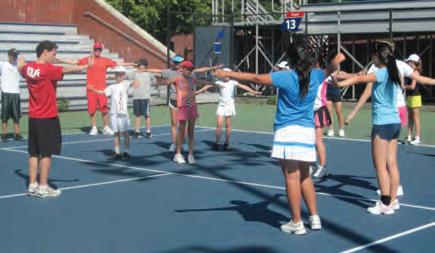
Please note that the camp will be held both indoors and outdoors this summer.
l June 2023 - August 2023
We offer summer camps for all ages and levels from 10 and under tennis to recreational juniors to high-performance players. Space may be limited so register early.
The weekly full-day program runs Mondays through Fridays, 8:30 a.m.4:00 p.m., with a one-hour lunch break or a twilight session from 4:30 p.m.-7:00 p.m. Campers work on the development of tennis techniques, tactics, sports conditioning, multi-sports, and strategy geared toward maximizing the learning experience in a fun presentation.
As the juniors develop, they are advanced to more challenging groups. Tennis activities include Stroke of the Day, team games, and competitive match play.
The camp also offers cross-training activities, such as soccer, softball, and basketball and other multisport training activities. Along with many fun activities on the grounds of the USTA Billie Jean King National Tennis Center, we also offer on site spirit days, talent contests and other on site activities designed for camper involvement and team building. The program accepts junior players, ages four- through 10-years-old for the 10 & Under programs.
Recreational players 11-years-old and up are enrolled in the Junior Camps (8:30 a.m.-4:00 p.m. or 4:30 p.m.-7:00 p.m.). Advanced High-Performance Tournament training campers will also be invited to participate in an intensive Tennis Academy training program.
The National Tennis Center has 18 outdoor courts, 12 indoor courts, and four stadium courts. Also on-site are ping-pong tables, ball machines, a fitness center, and other age-appropriate fun activities like arts, multisports, arts and crafts, and other engaging sporting events. The primary focus will be on developing tennis skills while offering other activities to enhance the learning and summer camp experience. Also offered are junior evening and weekend programs, as well as adult daytime, weekday evening, and weekend camps.
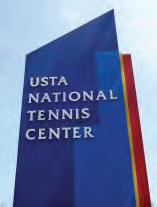
Thissummer, the College Tennis Exposure Camp will once again be held at various locations across the country, ushering in the 35th year of this one-of-a-kind tennis experience.
The College Tennis Exposure Camp is the only camp in the country taught exclusively by college head coaches which creates a unique opportunity for both junior tennis players who seek to play college tennis, as well as college coaches who are eager to learn from their peers.
“Ed Krass’ College Tennis Exposure Camps provide prospects with the
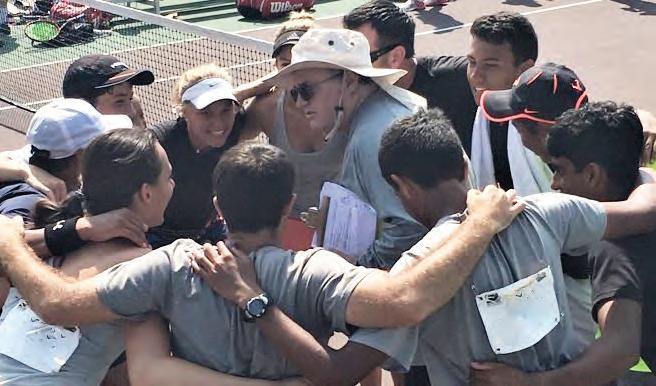
ultimate opportunity to showcase their skills and learn from college head coaches in a fun, energetic, and inclusive environment,” said Wouter Hendrix, the former men’s tennis head coach at Lehigh University. “I’ve seen so many players succeed at the collegiate level – including at Lehigh – thanks to the knowledge they gained at the College Tennis Academy. A true championship coach, Ed Krass provides the experience of a lifetime that will greatly enhance your game as well as your access to the world of college tennis.”
There are a number of testimonials
40 New York Tennis Magazine • March/April 2023 • NYTennisMag.comEd
Krass
By Brian Colemansimilar to this given by coaches and players alike on the impact the camps have had, and a lot of the reasoning behind those positive experiences comes from the aforementioned Ed Krass who founded the camp nearly four decades ago. Krass has combined his vast knowledge of tennis, especially collegiate tennis, with his strong passion and energy for helping people, which has resulted in almost 40 years of the camp.
singles and was a captain in his final two seasons at UCF.
During his playing career, Krass would spend his summers teaching at Harry Hopman’s International Tennis Academy. This helped him make a little spending money, an always-important part of college life, but also provided him with invaluable coaching experience.
“It was an amazing experience,” Krass recalls. “Not only did it help me with expenses, but also allowed me to learn from some top coaches as well as top-notch junior and professional players. After I was done playing at UCF, the Athletic Director asked me if I had any coaching experience. I told him that I did, and they offered me the position of assistant coach.”
It would only be a few months later that Krass would be promoted to head coach, and at just 22-years-old, he was leading a group of young men who were only a couple of years younger than he was.
“They couldn’t believe I was coaching them, but they saw I was serious and passionate,” Krass says. “Despite me being very young, they embraced my coaching style. I knew how to motivate and push them in practices.”
Krass helped guide UCF to some great seasons as its head coach including finishing his first season as the sixth-ranked team in the nation in Division II. He was ready to continue building that program, but when the athletic department budget at the university dried up, Krass was told there was no salary available, and so he left.
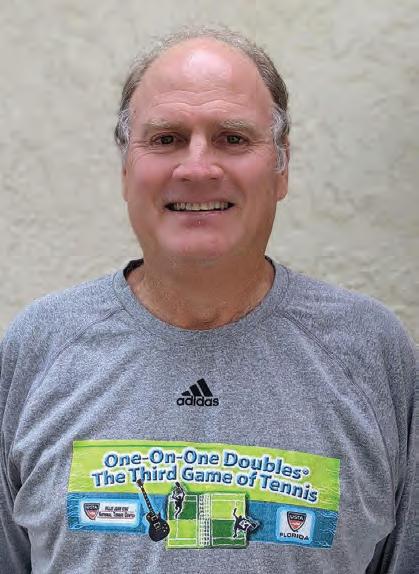
He would work as Rick Macci’s assistant at the Greenleaf Tennis & Golf Club in Florida for about a year before joining the staff at Clemson under legendary head coach Chuck Kriese. It’s there that Krass really fine-tuned his coaching approach, and credits Kriese’s mentorship for a lot of his own future success, including the introduction of one-on-one doubles tennis. Krass has even taken the one-on-one doubles concept and launched his own
tournament series, and were recently added to the UTR platform.
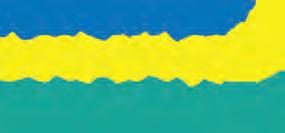
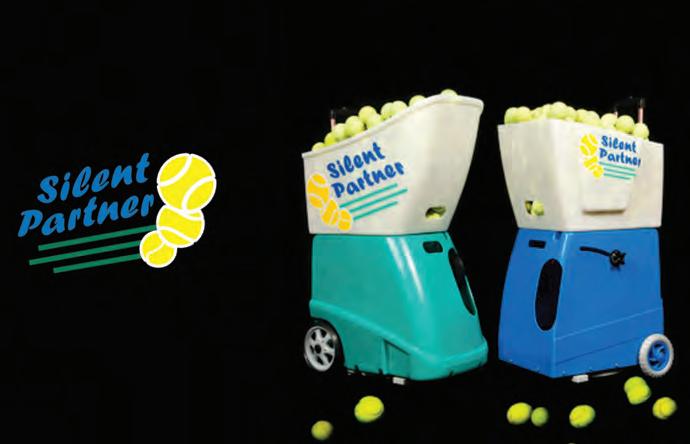
“I learned a lot from him. He had developed so many All-Americans, and he is sill doing great work at The Citadel,” said Krass. “I learned all about the one-on-one doubles there as it was one of the drills we did in practice. We almost won a National Championship there, falling to Patrick McEnroe and Stanford in the
quarterfinals. But we won a couple of ACC titles in my time there, and the overall experience was incredibly important for me.”
The third and final, and perhaps the most influential in his life, college coaching stop for Krass would be in the Northeast when he took on the job as head coach of the women’s tennis team at Harvard University in Cambridge, Mass. In more ways than one, this would be a life-changing stop along Krass’ journey.
“The people there were so driven to succeed, both academically and on the court, and I really had to learn to listen a lot more there in my previous stops. It made me more of a well-rounded leader, it was quite an interesting experience,” he said.
“I met my wife there so it was such a great time for me and my life. We went on to win four Ivy League titles and were a very successful program.”
All of these stops would eventually lead to a light-bulb going off in his head, and thus the College Tennis Academy, which would become the College Tennis Exposure Camp, was born. He had a lot of friends and coaches telling him that they thought a camp dedicated to bridging the gap
continued on page 42
between college tennis coaches and junior tennis players was a good idea, and Krass agreed.
“I think it was my third summer at Harvard when we started the program. I got some college coaches to help me, and in that first year we had a lot of different levels at that camp. It was really nice,” he said. “The year after, we decided to take it nationwide. We did one in California, and then Atlanta, one in Tampa and then finished the summer in Harvard. I knew we were onto something because of all the great feedback we were getting.”
And for the better part of four decades, Krass has continued that tradition and the camps have only continued to grow over the years. Krass’ last season at Harvard would be in 1990, but with his new business up off the ground and already making a positive impact, Krass had found a niche to bring his enthusiasm and experience to players and coaches across the country.
He is quick to give credit to his wife, Andrea, for the success of the camps, as well as all the coaches who have worked the camps.
“My wife has had a huge impact. She is a marketing person and has helped me grow the business,” he said. “It can be hard to do this in an
individual sport where everybody is typically out for themselves, but we have developed a brotherhood and sisterhood where coaches feel like they can really work together to not only help the kids but also help each other.”
The Camps are two-day events consisting of introductions and seminars from the coaches to start off the weekend, with singles and doubles match play and drills with on-court coaching on the first day. The second day features college-style team matches with on-court coaching, and all of this creates a balanced weekend which prepares the players for what they can expect at the collegiate level.
“The camp was one of the best tennis decisions I’ve ever made,” said former participant Ethan Garren. “I
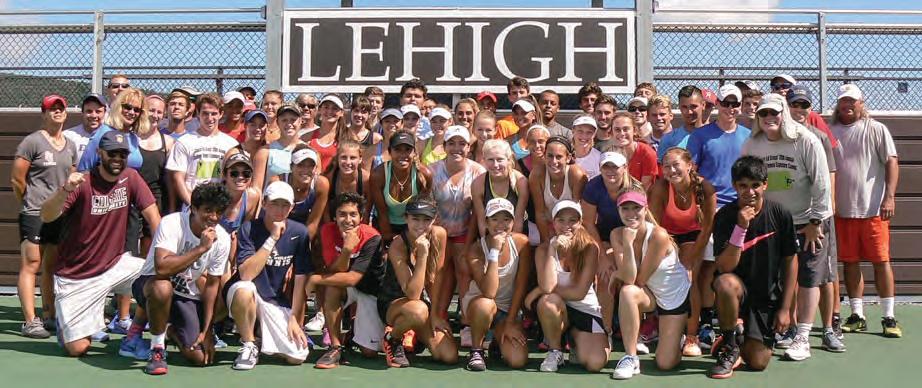
got to play a great amount of tennis, made some great friends, and made some very friendly relationships with the coaches at the camp. It was everything I could ask for—point play, friendly atmosphere, competitive and overall fun. The camp not only helped me tennis-wise, but it helped me understand the college tennis recruiting process and the life of a collegiate athlete.”
Krass and his arsenal of coaches will be back at this summer with five different camps scheduled including one from July 22-23 at Mercer County Park in West Windsor, New Jersey. And while it’s been 35 years, Krass has not lost a step, and is looking forward to another summer on the court helping young tennis players.
“This is what keeps me going. I have so much fun doing this, and I think the passion and enthusiasm I exude to everybody is contagious,” said Krass. “I’m fortunate enough to be built of the mold where I really get people. It can be teaching on the court, or sparking up a conversation with someone standing in line at the supermarket. I really enjoy being around people. I’ve been very blessed to be able to get along with people and see their positive attributes. I am super excited to be able to do this once again, it never gets old, and can’t wait to get going this summer.”
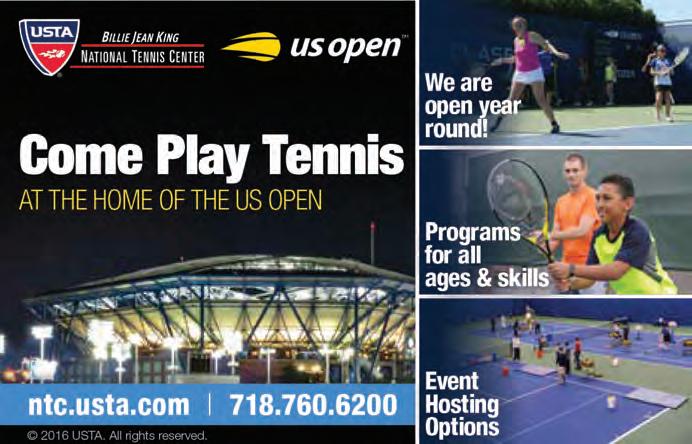
Sportsare supposed to be fun. They are a recreational activity and they give a person the chance to use their body, and find zest and excitement in life. When the young tennis player starts out, they fall in love with the game and can’t get enough of it. But after a period of time, they become competitive, perhaps spotted by a coach, enter leagues and tournaments to play more seriously and, voila, the fun fades and gets replaced by work, anger, anxiety and stress.
One of the most common questions I am asked by tennis players I work with is, “how do I go back to having fun on the court?” This seemingly simple question is very tough to answer because a large part of the motivation to play tennis at the highest level is unconscious. Those that get to the top are driven by their dark side which consists of feelings of inferiority and shame. Whether that comes from being bullied, tormented by an older sibling or abused by a parent or coach, the fuel to stay focused and climb all the way to the top usually derives from these negative feelings of inferiority, and the need to overcompensate to overcome them. The athlete then falls into the treadmill of effort and angst, and no matter how often they win, they still harbor unconscious feelings of shame and anger. Slowly but surely, they lose the joy, fun, creativity and playfulness they had when they first started playing.
These emotions are all crucial if one is to maintain interest and passion in the game. So how does one regain the joy of playing tennis? The answer lies in two areas.
Firstly, and maybe most importantly, one needs to learn about your true motivations. The loss of joy will often be due to the intense quest to be the best, to be superior in order to overcome feelings of inferiority. Good examples are seen in Jimmy Connors, Tiger Woods and the

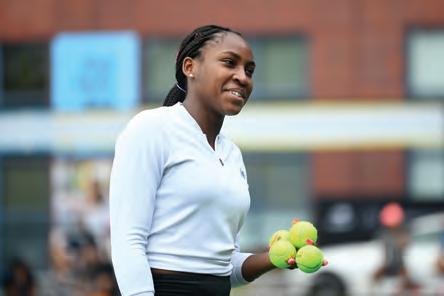
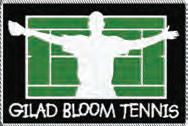 By Dr. Tom Ferraro
By Dr. Tom Ferraro
Williams sisters, all of who had tough upbringings and faced discrimination. They all became extremely demanding on themselves and perfectionists in order to overcompensate for their childhood shame. They slowly became internally demanding and angry. They all had high expectations as a way of escaping their feelings of lowness or inferiority.
Secondly, after insight into the unconscious dynamic is acquired, (and this is not easy), one needs to begin to have the intention to have fun and be light-hearted. This is what they mean by “taking time to smell the roses.” In the examples given above with Jimmy Connors, the Williams sisters and Tiger Woods, they were all lucky enough to have a good support system to bolster their mood and sense of joy. Connors had Pancho Segura to offer solace, while the Williams sisters had very supportive parents. Tiger Woods spent countless hours with Jay Brunza, a sport psychologist and also had very
supportive parents. Their support systems kept the love of the game alive in them by providing solace when needed.
I work with many professional athletes and when they enter slumps it is often because of a combination of overwork, anger and unrelenting pressure. Our sessions are geared towards relaxed casual conversations and as they learn to relax and have fun in therapy they are on their way to having fun and actually enjoying tennis once again. Tennis is a game; it is supposed to be fun, enjoyable and is one of the pleasures of life. It is a sad irony that those that are often the best in their craft wind up having the least fun. And when that happens, slumps, injuries and illness are on the way.
So try to remember that your goal in tennis is to have fun. Try playing with people you have fun with. Try joking around more. Try laughing more. When you begin to instill fun and playfulness in your game, you will see that winning takes care of itself. For consultations, treatment or on-site visits, contact Dr. Tom Ferraro Ph.D., Sport Psychologist, by phone at (516) 248-7189, e-mail DrTFerraro@aol.com or visit DrTomFerraro.com.
Throughoutmy professional career, I have been fortunate enough to have worked closely with a variety of parents and junior tennis players who have been able to make tennis their profession. Furthermore, I have helped many players achieve academic success through scholarships by ushering them into the next level of their developmental play on the court. In almost all of the above cases, regardless whether the goal was to make tennis a full-time career or to use tennis as an avenue to reach academic success with reduced financial strain, the road was complex, however achievable as long as the player and his/her family fully supported the process.
Starting from a very young age, and for the duration of the journey of junior tennis, a family with aspirations of their child becoming a professional tennis player absolutely must consider the extraordinary sacrifices required. They must consider time; roughly 25 to 30 hours (including a minimum daily commute and weekend travel to tournaments) a week for a minimum of 40-45 weeks of the calendar year, their academic studies, and the financial aspect of play. The basic costs of court time and necessary coaching, along with basic travel and equipment, can
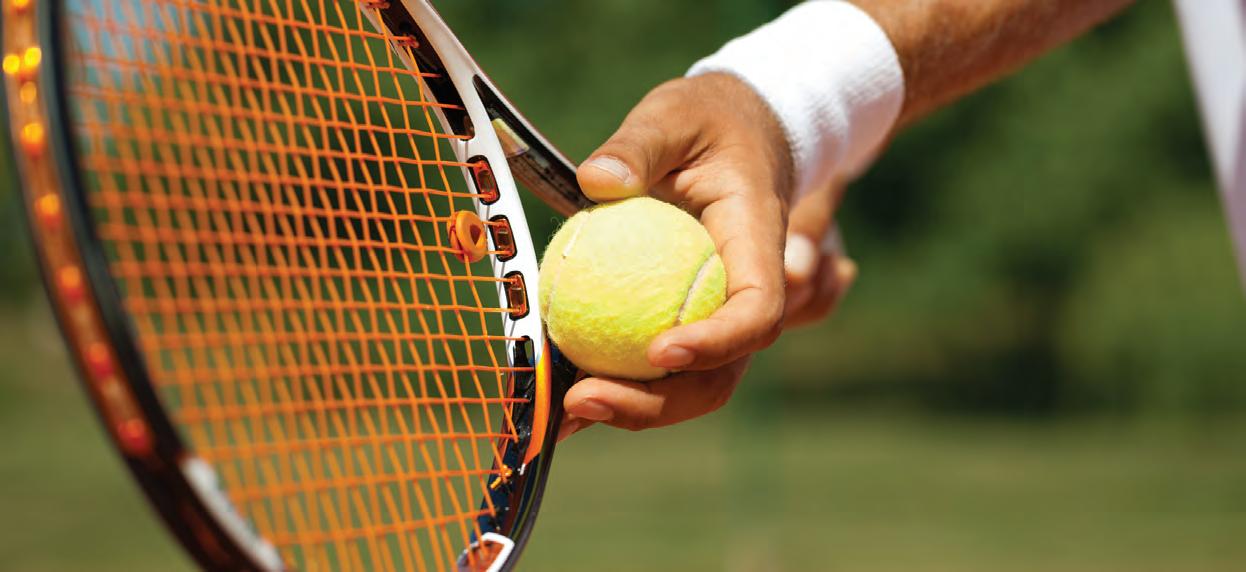 By Carlos Cano
By Carlos Cano
easily exceed $60,000 per year, not including higher level tournament travel and coaching.
Additionally, they must contemplate the sacrifices they will have to make to their personal life, which in most cases has to be fully aligned with the goals of the player.
If the goal is to consider tennis as an avenue for the player to get financial help throughout the collegiate journey, the family and the player should also strongly consider the sacrifices, as the reality is that the level of college tennis has been constantly raising, and with that the sacrifices that need to be made. While the player may not plan on playing professionally, he/she will still need to attain the skill level so that recruiters from universities will notice them. This will still call for hard work and incredible determination.
In regards to time, the player should plan to spend roughly 15 to 25 hours on the court each week. Of

course, they must also allocate the necessary time for their studies and academic work. Furthermore, even though the economic investment is not quite as high as the one to reach the professional level, it is still sizable as spending anything below $40,000 per year would be challenging.
The sacrifices that are required for the player to reach a certain level of competitive play also include less time for socialization, accepting that most holiday times available for the family would be spent traveling to and from tennis tournaments, and most likely a lot of missed time that a typical teenager spends on simply being a teenager. However, in many cases this is all well worth it, as the things that someone learns on and off the court during the above journey are priceless.
The rewards of the tennis experience outweigh all the sacrifices, and the meaning of giving the best to achieve a goal is something that is irreplaceable.
Carlos Cano is the Director of Coaches and a High Performance Coach at CourtSense. A member of the CourtSense team since its inception, and has played an instrumental part of the development of players such as Christina McHale, Matija Pecotic, Luis Flores and many other NCAA All Americans and tour level players.
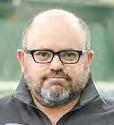
Inmy own head, I felt like I was playing with John McEnroe yesterday.
In the match, I played with impressive 4.0 skills, with several strokes that showed my 4.5 talents. On forehand returns, my arms remained relaxed as I rotated my hips and trunk in a perfect smooth working order and inflicted brute force on that defenseless ball.
John nodded, pleased with my returns.
Then it happened. You know that moment: a weak return from an opponent spins the ball into the air, where it hangs like a juicy orange on a limb, begging to be picked. I saw—or thought I saw—that flimsy return that needed a crushing putaway. I narrowed my eyes and went for the kill. I smacked the ball, intended for a magnificent down the line.
"Out!" Kathi, my opponent, called, with some glee. It was a good call. Perhaps I didn't follow through over my shoulder or I wasn't balanced properly on my feet. It was my fault. I could have done better. Then John piped in, "Seriously?" I

shook my shoulders ignoring him. His rant continued, like a repetitive loop on an old video tape. "Are you kidding? Why didn't you stay in the rally? You cannot be serious. That was not the ball to change direction." He was correct, but belittling.
Yet that voice was not the real John McEnroe on my court; it was one of my many inner voices, shouting into my ear. My mind had those overplayed videos of McEnroe's outbursts against referees and turned the words into a review of my own performance.
I still wanted inner-voice John on my shoulder. I need his steady guidance to put me back into a highlevel performance for this match. John McEnroe is a player of considerable skill and finesse, immensely competitive with a wide arsenal of shots. He mastered tennis and continued onto success as a writer, musician, and television
announcer. Yep, he's the one I want on my shoulder.
Dr. Tiff Jones of X-Factor Performance instructs her clients that tennis players can master responses to mistakes on court. In the video, "Elevating Your On Court Mental Performance", she discusses the science behind mental reactions to on-court situations and what to do in response.
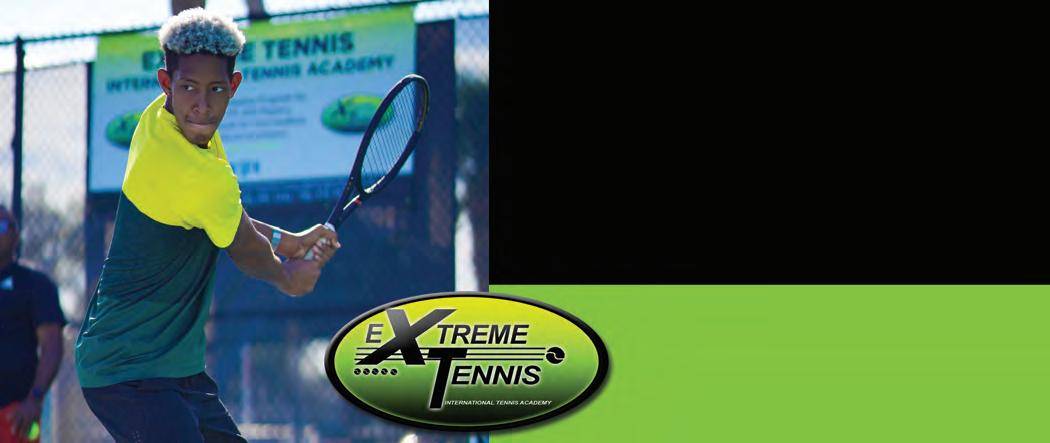
I had to change what was going on in my head and escape this negative input. I gave a long exhale, commonly called "Lion's Breath." I added another touch. I reached up to my opposite shoulder and flicked that negative inner voice off.

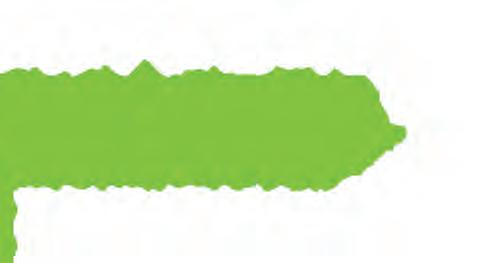
I returned to the match filled with long, fun rallies. Yes, I made unforced errors because I am still developing my tennis game. Yet, with good inner voices, a few Lion's Breaths, and removing those negative inner voice, I can control my responses to those mistakes.
 Barbara Wyatt is a Writer, Photographer, USTA Official, and Mobile App Developer of iKnowTennis!, the tennis rules app. Her poem, Ode to Tennis, an amusing poem on the joys and frustrations when learning tennis, is available at Amazon. She can be reached by email at BarbaraW@iKnowTennis.com
Barbara Wyatt is a Writer, Photographer, USTA Official, and Mobile App Developer of iKnowTennis!, the tennis rules app. Her poem, Ode to Tennis, an amusing poem on the joys and frustrations when learning tennis, is available at Amazon. She can be reached by email at BarbaraW@iKnowTennis.com
56 Brook Avenue
Deer Park, N.Y.
(631) 242-0220
CenturyTennis.com
31 Prospect Street
Huntington, N.Y. (631) 547-5200
GoldCoastTennis.org
Info@GoldCoastTennis.org
Since 1965, Century Tennis has been dedicated to the growing sport of tennis by building quality tennis courts and providing a specialized service to the tennis club industry, as well as the private community. By maintaining a high-quality of service and customer satisfaction over the years comes a trust that is ever so hard to attain.
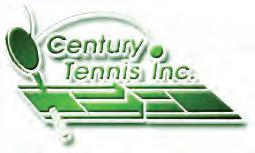

“We simply want to be the best at what we do.”
In order to build great tennis courts, you have to start at the bottom with an understanding of soil conditions and converting it to a good base. Lasercontrolled road graders enable Century Tennis to build with accuracy.
Building Post-Tensioned Concrete, instead of the old asphalt type courts, are proving to be a great alternative for “crack-free” tennis courts.

Whether it is a hard court with the softness of Deco-Turf or Classic Turf Rubber or whether it is a soft court like Har-Tru or Hydro Court, or a surface that offers a little of both like Nova Synthetic Turfs … Century Tennis can deliver.
The company is a member of the American Sports Builders Association (ASBA), Better Business Bureau (BBB) and the Long Island Builders Institute (LIBI). Century Tennis’ building techniques meet and or exceed those of the ASBA and the USTA and with its “Certified Tennis Court Builder” staff assures this quality. The company’s intention is to deliver the very best tennis courts for the most demanding players and tennis club owners.
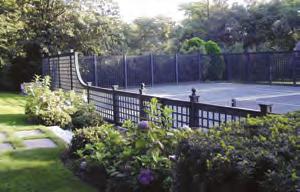
“Expanding the game of tennis, one court at a time.”
Laurel Gold Coast Tennis has been trusted for more than 35 years by Long Island’s top Country clubs and hundreds of homeowners to design, build and maintain tennis and sport courts. Laurel Gold Coast’s in-house team of experienced and knowledgeable tradesmen use only the best quality materials and have the ability to address any situation to ensure your court is ready for you to play at your highest level.
Laurel Gold Coast Tennis specializes in concrete, clay and asphalt courts. They also provide annual Har-Tru reconditioning, as well as weekly/biweekly/monthly court servicing. All weather court repair incorporates the use of Rite-Way crack repair system.
In addition to building and maintaining the court surfaces, Laurel Gold Coast Tennis designs and builds the entire court environment including fencing, irrigation, lighting, panting, masonry and seating furniture. Laurel Gold Coast’s approach ensures that your tennis or sport court enhances the appearance of your home and fits with your outdoor living lifestyle.
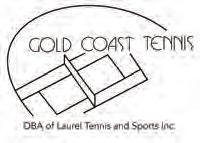
166 Industrial Way

Troy, VA 22974
(877) 4-HARTRU
HarTru.com

Har-Tru, LLC is a global tennis company based in Charlottesville, VA. It is the world’s leading provider of tennis court surfaces, tennis court consultation, court equipment and accessories. The company strives to help others build and maintain the best courts in the world, leveraging its products, knowledge, and experience to most effectively meet the needs of each customer. Har-Tru stays active in the industry as an advocate for the sport and sponsor of tennis related activities.
500 West Main Street, Suite 19 Wyckoff, N.J.
coach@sportprosusa.com www.sportprosusa.com
(877) 466-7765
As the Sport Court Tennis distributor for metropolitan New York, Long Island and New Jersey, SportsProsUSA offers a full-line of tennis court surfaces, accessories and amenities. Since 2006, Thomas Petersen, owner of SportsProsUSA, has overseen more than 300 court installations, refurbishing and retrofits throughout the region. Whether you are interested in a modular surface like PowerGame, a suspended surface like PREMIER COURT, premium crack repair systems like Guardian, or a cushioned or sanded acrylic surface for your all-weather court, SportsProsUSA is where to look first.

In addition to tennis, SportsProsUSA offers event management for unique sports themed events and temporary court installation services. Our construction division also distributes and installs a full-range of products and surfaces for basketball, baseball, volleyball, futsal, soccer, team handball and more.

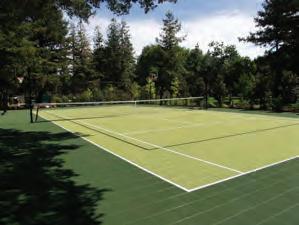
Residential, commercial and institutional clients look to us for advice when specifying, planning and executing small and large scale projects. Our event management division specializes in unique sport themed events. From concept to execution we cover the full range of services to meet your needs.
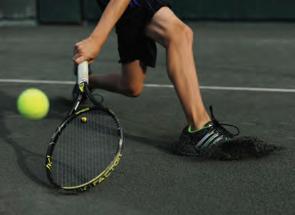
6 Kerr Crescent
Puslinch, Ontario, Canada
(888) 445-3223
TheFarleyGroup.com


1455 New York Avenue
Huntington Station, N.Y.
(631) 427-5904
Velvetop.com
The Farley Group has installed more than 30 tennis bubbles in the New York City and Long Island areas, helping tennis facilities extend their season into the winter months. For seasonal or permanently installed tennis bubbles, The Farley Group is your number one source for quality, service and dependability.
As a manufacturer, supplier, installer and service provider of air-supported structures, The Farley Group works with you from conception to implementation and beyond. The company’s philosophy is built around the belief that a customer never leaves The Farley Group—from project planning and installation to ongoing service and maintenance—we become a trusted member of your team. The company’s expert staff of sales consultants, designers and highly-skilled production and service professionals are well-experienced in all facets of air structure technology, ready to help you through every phase of your tennis bubble project.
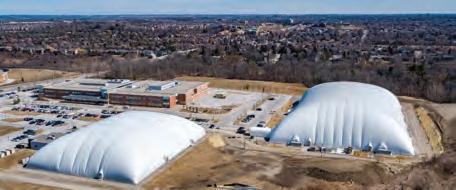
VelveTop Products is a family-owned and operated business since 1968. VelveTop is a stocking distributor of a full line of tennis court materials and equipment, including:


• Deco Turf: The Cushioned Tennis Surface of Champions
• Har-Tru: Developing Champions Since 1932
• Douglas Sports: Nets, Windscreens, Divider Nets
• RiteWay Crack Repair Systems
• Deep Root: Tree Root Barriers
• Hadeka Red Clay
For more information, call (631) 427-5904, e-mail elsy@velvetop.com or visit VelveTop.com.
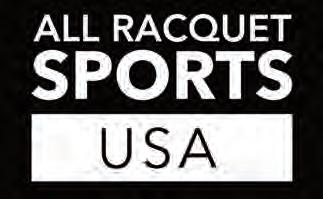 presented by adidas Pickleball
presented by adidas Pickleball
As we see a steady rise in more and more people partaking in paddle and racquet sports, most notably pickleball and tennis, there is one sport that continues to grow in popularity that you may not be completely familiar with: POP Tennis.
POP Tennis, short for POPular tennis, is a twist on paddle tennis and dates back to 1898. Played on smaller courts with shorter solid paddles, lower compression tennis balls and the same scoring and rules as tennis, POP Tennis is a great complimentary sport to tennis.
“POP Tennis is the closest complementary paddle sport to regular tennis,” said Mitch Kutner, the President of the International POP Tennis Association. “The rules and scoring are the same as tennis, except that players get one underhanded serve. The footwork, strokes and aggressive strategies from the baseline are the same as tennis, with serve & volley being a central part of the game. The court is smaller and balls are slower which helps to create fun, exciting rallies, and a lot of intense back and forth net exchanges.”
POP tennis is currently being
played in 34 states across the country, with the highest numbers of player clustered in Arizona, California and Florida. There are estimates of total players in the United States ranging between 1.25-1.5 million with hundreds of thousands more throughout Europe, India, Australia, New Zealand and Japan.
Right here in New York, POP
Tennis continues to grow with courts being installed in many spots in our community. Jones Beach on the south shore of Long Island put up courts last year, as did many other beach clubs near Breezy Point and Coney Island.
In addition, Rye Raquet Club in Westchester has courts, as does Stuyvesant Town and Peter Cooper Village in New York City. Not to mention the array of private courts being put in many backyards across the Northeast.
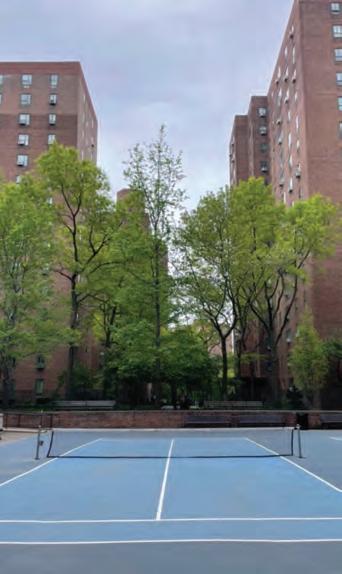
“Seeing the growth over the past few years at country clubs, tennis facilities, retirement communities, gated communities, private residential backyard courts and many players buying portable nets and setting up temporary courts,” added Kutner. “A great workout and POP is an equalizer as players of different ages and ability levels can all get on the same court and have fun recreationally. POP is tennis, just an easier version. POP can be played year round, indoor or outdoor on all surfaces including hard court, clay, grass/artificial turf, modular sports tile and hard sand on the beach.”
You can learn more about POP tennis and find great products by visiting AllRacquetSports.com/Pop-Tennis.
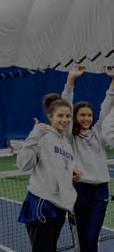
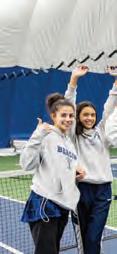
Carrie-Anne Hoo started off her 2023 with a fantastic result at the annual USTA Winter National Championships in Tucson, Arizona. In the Girls’ 14s division, Hoo, who trains at the USTA Billie Jean King National Tennis Center, powered her way to the finals with six consecutive straight-set wins before falling in the championship match to finish as the event’s runner-up. Hoo followed that up by winning the singles and doubles titles at the L2 event in Macon, Georgia in the Girls 14s divisions.

Luma Teixeira of the Ross School Tennis Academy made her way into the finals of the L5 tournament in Nashua, New Hampshire in the Girls 14s singles division. Teixeira came back from a set down in the semifinals to secure her spot in the championship match, and she finished as the event’s runner-up.
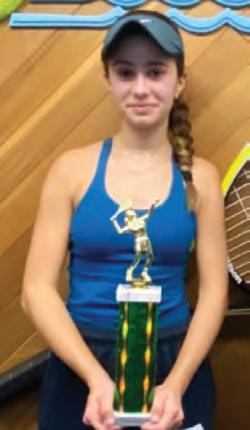
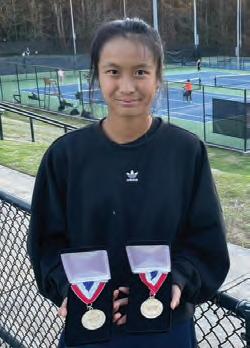
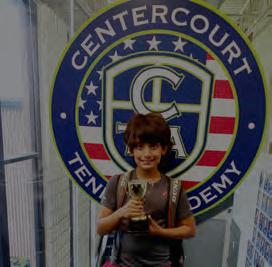
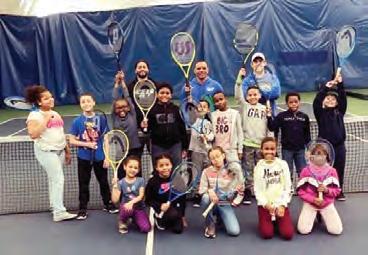
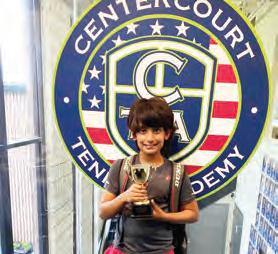
• All teams compete in
• Four players each nig
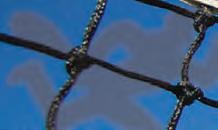
• Advanced, advanced i
• Matches are played M Introdu
a W T T format ht ntermediate and intermediate Monday to Thursday evenings f
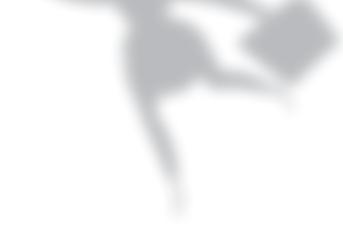

HI-FIVE, the fun new divis
omote competit levels to pr or 2 hours ion for team
oking w sty skills orde n, fit s
For those teams that are looking for a less competitive format, want to get in shape, or just get their old rusty tennis skills back in working order, we introduce our new Hi-FIVE division, that incorporates heart pumping fitness drills, tennis skills drills and fun games.
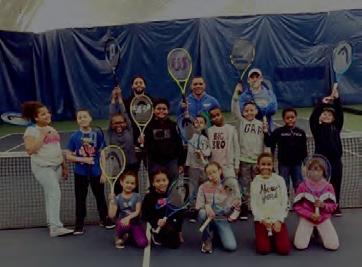
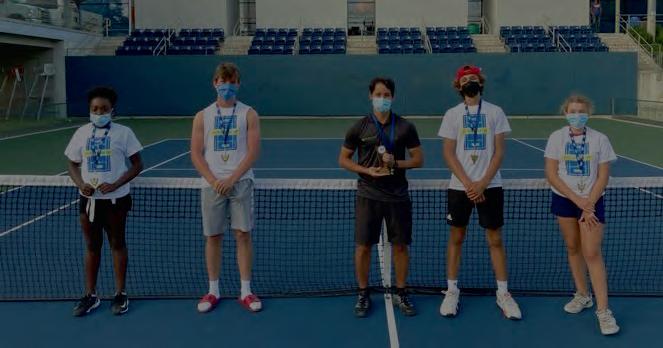
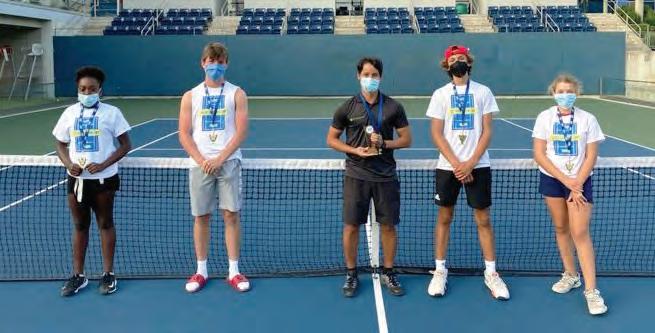
building and professional er, we introduce tness drills, www.m Contact information or
networking! etrotennis.com Luis Espinoza for more at: Luis@metrotennis.com call 212-244-2845 50 New York Tennis Magazine • March/April 2023 • NYTennisMag.com

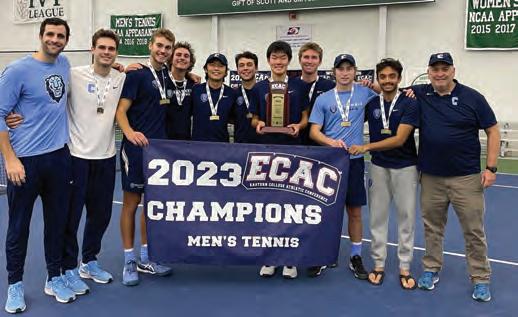
Freshman Michael Zheng delivered a crucial victory for his team as the Columbia Lions’ won the 2023 East Coast Athletic Conference (ECAC) Championships. With the overall match tied at 3-3, Zheng, who trained at the Centercourt Tennis Academy in New Jersey and is in his first season competing for Columbia, defeated Harvard’s Harris Walker in three sets to seal the win.
Savannah Minter took home the title at the L6 Girls 14s Clay Court Championships at New York Tennis Club. Minter, who trains at Cary Leeds Center for Tennis & Learning, did not drop a set throughout the tournament to earn the championship.
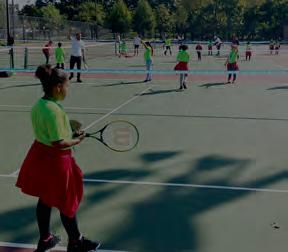
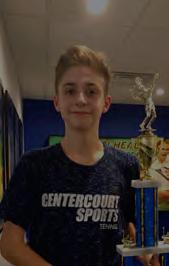
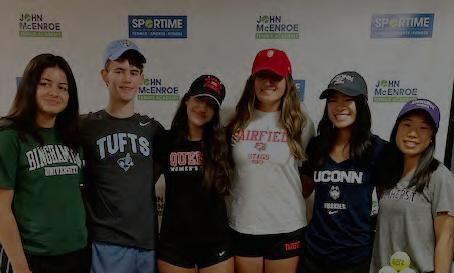
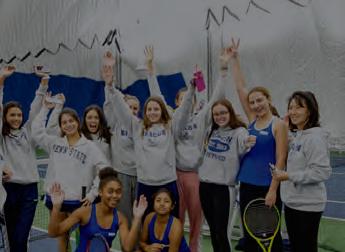
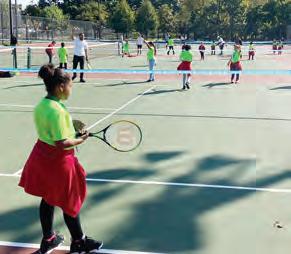
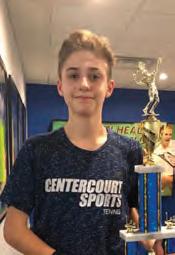
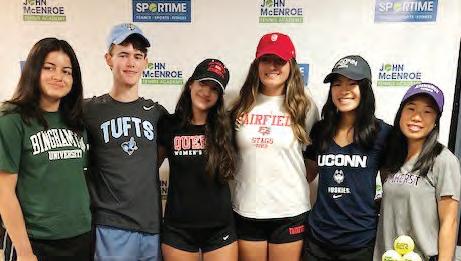
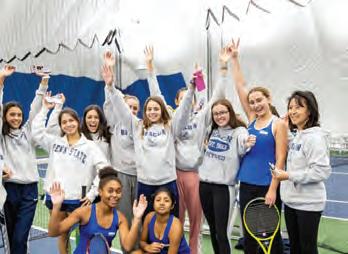
At the L4 Championships at Centercourt Tennis Academy, Santiago Salazar won the title in the Boys 18s singles division. As the top-seed, Salazar, who trains at CourtSense Performance Training Center, twice came back from a set down to win matches, including a 1-6, 76(1), 6-1 victory in the championship match to claim the title.
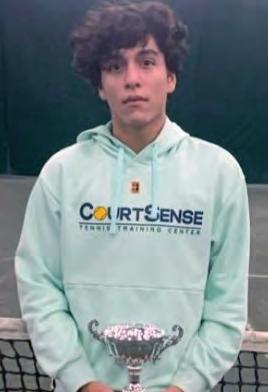
Genesis Brown, who trains at MatchPoint NYC in Brooklyn, captured the title at the L6 Championships at Sportime Lake Isle. Brown won all of her matches in straight sets en route to taking home the win in the Girls 14s Singles division.
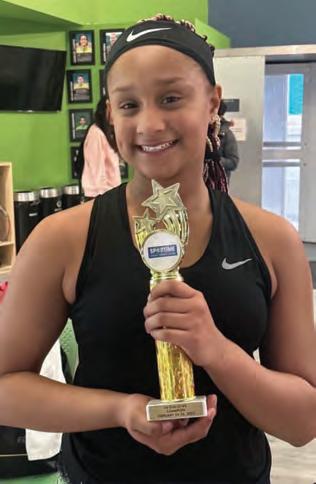
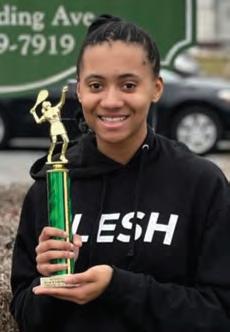
continued from page 51
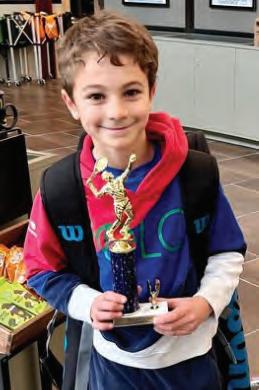
Competing in the Boys 12s division, Jacques Gunalp earned the title at the USTA L6 event at the Ross School Tennis Academy in the Hamptons. The event’s draw was split into two groups, with the winners of each group playing each other in the final. Gunalp, who trains with the John McEnroe Tennis Academy, was the event’s top-seed and would win his group before going on to win the championship match.
Isabella Miraflores took home the title at the L6 President’s Week Championships at New York Tennis Club. Miraflores, who trains with Gilad Bloom Tennis, won the Girls 16s singles title by winning all four of her matches including a 6-4, 7-6(4) victory in the finals.
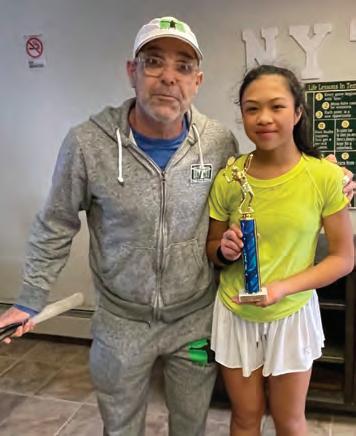
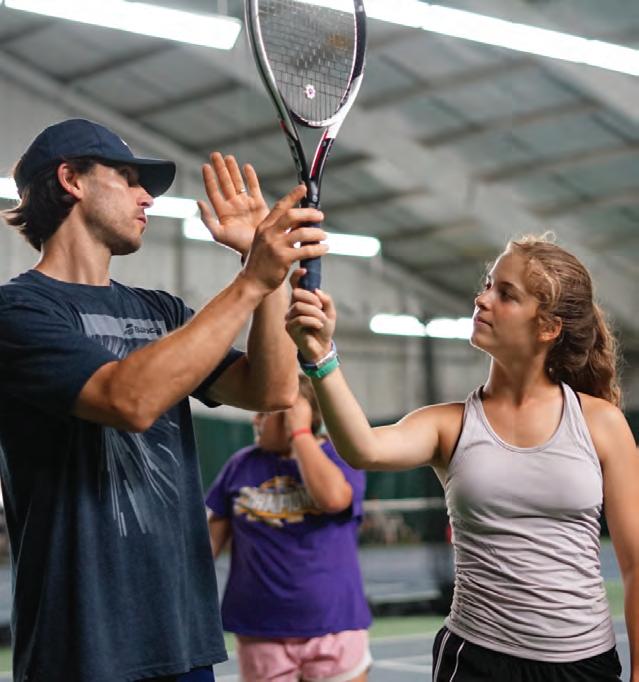
Tennisfans, I am still floored that we are in 2023. And while the tennis world continues to evolve, it stays the same.
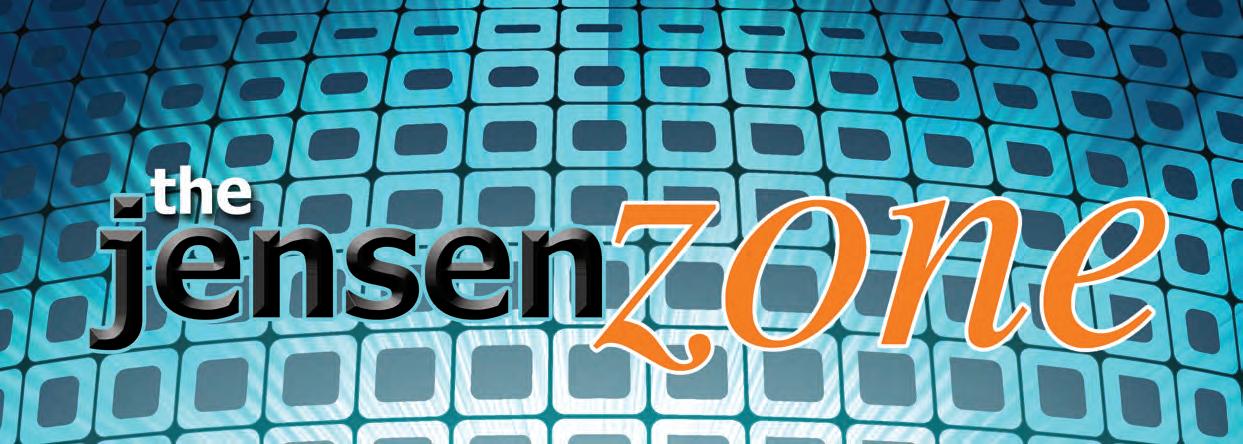
On the pro tour young faces like Ben Shelton and the teenage Fruhvirtova Sisters continue to improve against the toughest talent on the planet. I’ve been able to see these future stars up close under pressure and what stands out to me is how mature they are at this level. Shelton comes from a tennis family where his dad was a very successful professional player, and his Uncle Todd Witsken even beat Jimmy Connors at the U.S. Open one year! Handling the pressure of living up to such a strong family legacy is enormous but Shelton embraces the competition, and his smile in the biggest moments in matches is his secret weapon.
Linda and Brenda Fruhvirtova will turn 18 and 16, respectively, in early 2023 and Linda has already won a WTA Tour event while Brenda is in the top 100 on the WTA rankings after qualifying for the Aussie Open. What stands out to me with them is the way they work together and support each other. The professional tennis tour is extremely lonely and the rigorous lifestyle burns more talent out than the level of competition does. Both Fruhvirtova sisters are tremendous fighters and in all the matches and practices I’ve witnessed, they are always in control of their negative emotions that can be a competitor’s biggest weakness. I think the future is bright for these three young pros.
By Luke JensenThere are also great lessons to be learned from the veterans on the tour. The first major of the year produced some memorable story lines. Aryna Sabalenka was as talented as anyone on tour but had never won a major title in singles. In 2022, Sabalenka’s second serve was a mess. Her double-faults would be in the double digits matches which led to her giving matches away. Sabalenka retooled her mental approach and techniques to create a reliable second serve and catapulted her to the winning run in Australia. Sabalenka called it taking responsibility for her problems on the court, which is a very interesting approach from a modern player.
The story of the 2023 Aussie Open, in my opinion, is Novak Djokovic who won his 10th Aussie Open and 22nd major singles title. A player that seems to find solutions to distractions both on and off the court continues to grow his game. Djokovic is not known for his serve but at one point in the final set of the finals, he won 22 straight points on his serve. He’s a player with a growth mindset that is always looking to improve on his performance, and I learn something new every time I see him compete. His mindset stands out most of all as he is always in control when things seem to be spinning
out of control. It’s an honor to see him compete.
Switching from the pro tours to the local ones, we will soon be entering the spring season and those outdoor leagues are beginning to start. Have you done an evaluation on what you want from your league experience? Are you on the right team and level of play that makes you happy or frustrated? The relationship you have with tennis should be a healthy one where you are excited about being with your teammates in practices and matches. I always advise players to find teams that make you smile when you are together. I’ve been on all kind of teams in my tennis journey and the best outcomes happened when I was with good people. There are times when the teams that win the most are the most difficult to play with. Find a squad where you can play as much as you can commit to depending on your schedule. Remember when you join a team be prepared to play with different partners. Nothing drives a team captain crazier than a player that has conditions, a player that only plays on one side or a player that only plays with certain partners.
Think about the team when you join a squad and what you can do to contribute to the FUN of the season no matter of you win or lose.
Born in Grayling, Mich., Luke Jensen’s resume includes 10 ATP Tour doubles titles and singles victories against Andre Agassi, Pete Sampras, Ivan Lendl, John McEnroe, Bjorn Borg, Jimmy Connors, Boris Becker, Stefan Edberg and Jim Courier. Jensen and his brother, Murphy, won the 1993 French Open doubles title. Luke is currently director of tennis at Sea Island Tennis Center in Georgia. He may be reached by phone at (315) 443-3552 or email lukejensen84@yahoo.com.

Oneof tennis' big mystiques in the world of sports is the "choke." We have all been there, including the great champions. A player will put together a set and a half of perfect tennis, but when it's time to close out the match, all of a sudden, things change … the level of play inexplicably drops, legs get heavy, hands get tight, the toss on the serve falls too low, and routine put away winners turn into unforced errors.
Before you know it, the match slips away, the momentum shifts and the window to win a match closes forever. Afterwards in the locker room, you will sit with a towel over your head and wonder how come you lost a match that should have been yours. It's very frustrating when you are playing well enough to win and still come up short. You often wish you could play those key points again in a different manner.
Closing out a match is the toughest thing in any sport. In tennis, it is especially hard because you cannot play the clock, you actually have to win the last point. Closing out a tennis match is an art in and of itself, and perhaps the most important skill for a tennis player to master.
It is human nature to grow more anxious when you are ahead and closer to victory. You start to think

about the winning shot, and it takes your mind off the actual point-bypoint mindset. Because of tricks of the mind, you might change your strategy for no reason or start to make bad decisions. In many cases, players would become passive when leading, playing too safe and expecting the opponent to fold. Other ways of "choking" might be getting overly aggressive and selfdestructive, literally bringing the opponent out of the grave by giving up easy points.
Another factor is that when you are leading, it is common that your opponent will play without pressure and start making shots that were not going in earlier in the match.
Of course, the million dollar question is how to avoid being that player who cannot close out a match. Here are a few tips on how to avoid that stinging feeling of losing a match that was yours:
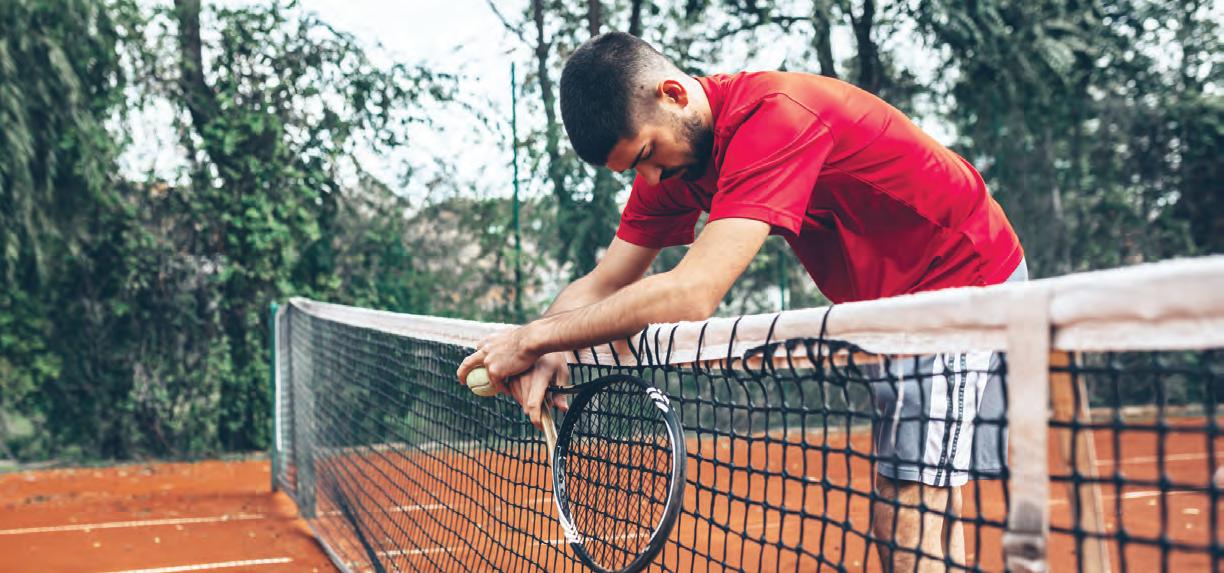
1. Nobody is immune to choking. Even the great John McEnroe, holder of seven Grand Slam singles titles, admitted to me years ago that he choked, specifically speaking about the famous French Open finals in 1984 against Ivan Lendl when he was up 2-0 in sets and a break up in the third set. So if you do end up
By Gilad Bloomchoking, don't let it bring you down … suck it up, learn from it and don't forget that the choke has two sides. The next time, you might be on the other side. If you expect that it is part of the game and don't let it get to your head, you can survive a few chokes in your career.
2. Smell the blood. When you are leading in a match, try to keep the pressure on your opponent and avoid complacency. Try to be greedy and run away with the match. Great champions smell when the opponent is bleeding and hit them where it hurts without mercy. The key is to keep the same strategy that got the lead, and remain aggressive and relentless. Show your opponent through body language that you are there to win the match, and preferably, in straight sets.
3. Do mental exercises to improve your performance. There are breathing techniques that help get the heart rate down and calm your system down between points. Also, being bouncy on your feet can help relax the muscles and bring you to a necessary optimal combination of alertness and composure. Ideally, you want to get to a level where you play totally instinctively during the big points without having to think too much.
4. Have a specific game plan to close out matches and stick to it. Many times, we change our game plan during big points. It is important to be gutsy and execute a game plan. It's especially important to stay aggressive during critical points of the match. Usually in higher level tennis, the one who dictates the pace of the match will win. Before critical games, I would actually plan the first two points on my service game while sitting down during the changeover. It is easier to execute your plan, if it is planned ahead of time.
5. Think outside the box. Tennis can be a stressful sport and there are some ways to decrease that pressure. For example, I never used to look at draws when I played on the pro tour. That meant I went to sleep without a specific name or face of an opponent in my head. It helped me focus on my preparation and not
think about the opponent. Another method of fooling yourself is when you are leading, tell yourself that you are losing. For example, if you are up 5-2, you tell yourself during the changeover that you are down 2-5 and that you should play as if you are down. It is an interesting exercise which actually worked for me in some cases.
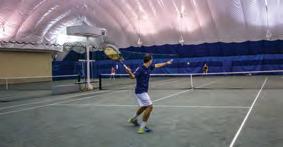
6. Don't pay attention to practice sets, use it as an experiment. Practice makes perfect, and if you practice a lot of point situations in training, you will be more ready for it in an official tournament. However, you cannot

ever forget that what matters is the tournament results, so “chokes” during practice don't count. In fact, it's better to play those bad sets in practice and have it all come together in the actual tournament.
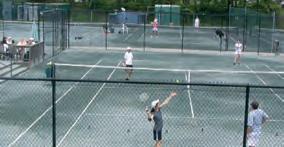
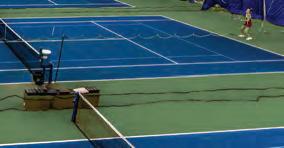
7. Most importantly … keep the big points simple. Most matches are won with basic tennis, by making your first serve when needed, playing the percentages, making your cross-court shots and not missing the easy shots. You don't have to go for the spectacular shot unless you need to. If you can make the opponent hit the extra shot, then who knows, your opponent just may be the one who chokes.
Gilad Bloom is a former Israeli Davis Cup player and two-time Olympian, played on the ATP Tour 1983-1995, reached the fourth round of the U.S. Open in 1990, reached a highest ranking of 61 in singles, was Israel Singles Champion three times. Bloom has been running his own tennis program since 2000 and also was director of tennis at John McEnroe Tennis Academy for two years. He can be reached at bloom.gilad@gmail.com.

Imaginethis … you just turned pro. You play a few tournaments, and in your first year, your record is 2-3. Okay, fair enough as you’re just getting into things.
In your second year, your record is 1214. You play two Davis Cup matches and lose both and then lose in the first round of all seven outdoor tournaments you entered. You also fail to reach the main draw of the U.S. Open and Australian Open Grand Slams due to losses in the qualification rounds. Okay … so this is going to be hard.
Then, in your third year, you lose in 21 out of 38 first round matches! Your season ending record is 27-30.
In your first three years as a pro, you compile an overall record of 41-47. Hardly what you expected.
If this happened to you, how would you feel about your game? What would you think of your prospects in terms of making a living as a pro tennis player? What would you think about reaching your goals?
As a mental training coach, when I ask kids these questions, most say, “It would be rough!” others have even said, “I’d look for another job!” Well, thankfully, the fellow I am talking about above didn’t look for another job. This is the story of how Roger Federer began his professional career.

Roger and his camp must have known or believed what others didn’t: That he was “good enough” to do this. Clearly, early in his career, he was not good enough as a tennis player, otherwise he would have been winning more matches. But while it would take time and experience to get traction, he must have had an intrinsic feeling that, regardless of the mounting losses, he was good enough to keep going. This spirit would act like fuel in a car. It would allow him to persevere, learn from adversity, not overreact to losses and not judge every match as an indicator of his future or if
he was good enough.
Certainly the rest is history. Federer continues to amaze. It seems at every level he plays, whether he wins or loses, he seemingly doesn’t define himself by the outcome. Rather, his focus is on what he can control: Doing the best he can, bouncing back and improving.
Similarly, if we look from the outside in at Stephen Curry and Tom Brady, both of them were not good enough early in their college careers. If people only looked at the stats, no one would ever have predicted the greatness they have achieved. It took time for them to be the superstars they are recognized as now.
Somewhere deep inside, they must have believed, “Hey, I can do this.” Seemingly, they were comfortable where they were, being good enough at the present time as a person and athlete, not trying to rush the process to be something
they weren’t. Their real game was about learning, improving, working hard and cultivating a spirit of courage, confidence, humility, resiliency and purpose under pressure, especially when others didn’t believe. Coming from this place, even if they found they were not good enough on the athletics field, they could walk away knowing they gave 100 percent. Their score did not determine their worth, and, as people, they were good enough.
I know, you’re not Roger, Stephen or Tom … so what does this mean for you? Just like them, you are good enough! No matter what level you are currently playing at, or whether you win or lose in your next tournament, you are good enough. Don’t let others or the results be an indicator of the future. You are more than an athlete. Knowing this will provide the freedom you need to let go of the results, so that you can stop feeling like you have to prove anything to anyone, and instead, focus on what you need to do to continue progressing and bring all the attributes of who you are to the court.
That’s what the players and commentators mean when they say, “So and so is playing within themselves, they are letting the game come to them and are not forcing things.” This is the point where the magic happens. When you bring your spirit, your whole self, and your heart to the competition, the results begin to speak for themselves. Then, even if you lose on the court, you still know you are good enough!
Trust your process. Trust in that little voice that says: “I can do this.”
Federer, Curry and Brady were good enough and so are you!
Rob Polishook, MA, CPC is the founder of Inside the Zone Sports Performance Group. As a mental training coach, he works with the whole human athlete helping them to unleash their mental edge (heart.energy.spirit) through mindfulness, somatic psychology, animal wisdom and mental training skills. Rob is author of 2 best-selling books: Tennis Inside the Zone and Baseball Inside the Zone: Mental Training Workouts for Champions. He can be reached by phone at (973) 723-0314, by e-mail rob@insidethezone.com, by visiting insidethezone.com, following on Instagram @insidethezone

Distribution scheduled for 05/01/23
This edition will feature:
• Tennis in the Hamptons
• 2023 French Open Preview
• New York Tennis Magazine’s Summer Series Preview
• Boys' High School Tennis Update
• The Growth of Pickleball/Padel
Print distribution across New York at 300+ locations.
Digital distribution across website and social media pages, and the e-Edition will be e-mailed out to our full data base.
Don’t miss the advertising opportunities in the next edition of New York Tennis Magazine May/June 2023!
Facebook-www.Facebook.com/NewYorkTennis Instagram-@NYTennisMag • Twitter-@NYTennisMag
Submissions for both advertising and editorial are due by April 7, 2023
For more information, please call 516-409-4444 or e-mail Advertise@NYTennisMag.com
